insights
Encountering the Resurrection Changes Everything
Gifted &
Risen Called Christ
Formation & Period of Discernment

NEURO DIVERGENT FOLLOWERS OF JESUS

How the
AUTUMN
2024

LIST ON VENNU TO MANAGE YOUR HALL MORE EASILY
Vennu is an easy to use platform with:
• Enquiry and booking tracking.
• Online payments.
• Money paid directly into your nominated bank account.
• Listings with photos and all the details people want to know.
• Availability calendar.
• Digital marketing campaigns and resources.
• Support available 7 days a week.
“We have increased our bookings considerably since using Vennu last year. The platform is user-friendly and their team is very supportive and helpful.“
Jessica Shaw Community + Property Manager Leichhardt Uniting Church
Vennu is a new way to promote. Turn idle capacity into revenue. Increase bookings. Engage with new customers. Enhance community connection. Bring life into previously underutilised spaces
Reduce time spent on calls and administration.

2 insights
It’s easy to get started No upfront cost No term contracts OUR SOLUTION BENEFITS TO YOU
community
promote growth call: 1800 549 811 or Email: support@vennu.net Vist vennu.com.au
Connect with your
to


WELCOME FROM THE GENERAL SECRETARY
Wellspring of life
 REV. JANE FRY GENERAL SECRETARY
REV. JANE FRY GENERAL SECRETARY
How do you so organise your life to make time and space available for God to ‘form’ you – heart and soul, mind and strength – as a follower of Jesus, a child of God?
I am forever grateful for the wise mentors that guided and supported my first steps as a disciple of Jesus Christ. What I learnt from them is that discipleship practice is both very, very simple and very, very difficult. I was reminded of this by a throwaway comment made by Sister Julienne (Call the Midwife) who spoke of ‘the privilege and discipline of prayer’. Somehow, I don’t think she was referring to the ‘shopping list’ prayers that are so common, but to that deep connection born of relationship with God that is always the wellspring of a devoted life. I’m aware that mountains of books have been, and will continue to be, written about prayer. Many of them are handbooks for those beginning their discipleship walk, but most importantly, is the living God who yearns to be in relationship.
to us. ‘Just do it’ to quote a familiar slogan – it is as simple as that.
PRAYER REFLECTS BELIEF IN A TRANSCENDENT DEITY WHO SEEKS, YEARNS, TO BE IN A LOVING RELATIONSHIP WITH ORDINARY, EARTHLY HUMANS
Martin Luther is famously credited with saying that he spent two hours a day in prayer unless he was very busy. When he was busy, he prayed for three hours before beginning his work. In our own day, when ‘busyness’ is, for many of us, an expectation, almost a measure of our worth in the marketplace, it’s very difficult to contemplate setting aside any time, let alone two or three hours for prayer. Given that we’re all probably aware of the damage that unrelenting busyness has on all our relationships, it should come as no surprise that it has similar consequences for our relationship with God.
Sometimes we can only learn this the hard way, once the wheels have really fallen off. After that, the discipline that Sister Julienne refers to can provide a very welcome support and it is as simple as turning up and being present to God, turning away from all other demands and distractions, and turning on our hearts and minds to hear what God is saying
Where it gets difficult is not just because prayer is a bit weird in a world obsessed with ‘productivity’ and ‘outcomes’, though that’s often true. What makes prayer really weird is that it simply reflects belief in a transcendent deity who seeks, yearns, to be in a loving relationship with ordinary, earthly humans. Though this belief was once widespread, ‘normal’, it is now unusual, weird in the eyes of the world. There’s no point pretending that the church and the life of disciples is not influenced by the prevailing or dominant culture that seeks to colonise our attention in its own interests. It’s particularly difficult when that culture is loudly proclaiming ‘You’re worth it’ and making human beings sufficient unto themselves and assuring them that the latest ‘bright shiny object’ will provide the satisfaction and fulfilment that they crave. The plain fact is that if we forget or abandon the ‘the discipline and privilege of prayer’ as the foundation of our life with God, we are surely surrendering ourselves to be ‘formed’ by the values and beliefs of the culture.
I confess that, like many others, I’ve learnt this painfully the hard way and while I always recognised the necessity of discipline it was fueled more by duty than desire. I certainly had no sense of the ‘privilege’ of prayer. Now I have some inkling of what Luther was getting at – in a world that will pull you every which way with busyness and noise, being able to draw strength, guidance, comfort, and courage from the wellspring of life is simply a privilege
insights 3


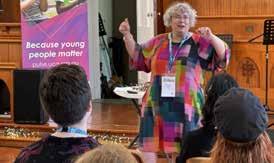

4 insights EDITOR Jonathan Foye | PRODUCTION/DESIGN Rana Moawad | EDITORIAL/ADVERTISING/DISTRIBUTION ENQUIRIES: Insights, PO Box A2178, Sydney South, NSW 1235 | insights@nswact.uca.org.au | www.insights.uca.org.au Insights is published by the Uniting Church in Australia, Synod of New South Wales and the ACT. Articles and advertising content do not necessarily reflect the views of the Editor or of the Uniting Church. Contents copyright. No material from this publication may be copied, photocopied or transmitted by any means without the permission of the Managing Editor. CIRCULATION: 10,000. ISSN: 1036-7322 Commonwealth of Australia 2023. REGULARS 6 YOUR SAY 7 NEWS 37 PULSE 41 LECTIONARY REFLECTIONS 44 BELIEF MATTERS 46 ENTERTAIN ME The Uniting Church in Australia is one of the country’s largest denominations. Our vision is that it will be a fellowship of reconciliation, living God’s love, following Jesus Christ and acting for the common good to build a just and compassionate community of faith. Gifted and Called 16 31 38 44 32 Formation and Period of Discernment

EncounteringRisenthe Christ
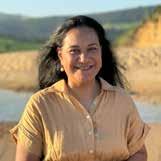
REV. FAAIMATA HAVEA HILIAU MODERATOR

Access the Moderator's Easter Message:
easter.uca.org.au
This new year brings a fresh opportunity for the transforming Spirit of God to be at work across NSW, the ACT, and our world. In early February I was in beautiful Gerringong, the land of the Dharawal people.
I was there on retreat with our young people who offer leadership to their communities and to their Churches. It was an exciting opportunity to worship with them, and to pray, lead, and listen. To ask - what does Easter mean for them in 2024? To question if the story of Jesus is still relevant to them, in a time where accessibility to information, data, and choices are at a click of a button. I couldn’t wait to hear what they're hearing as they engage with children and young people in their Church and community.
Easter for me begins by Mary going to the tomb early in the morning and discovering it empty. However, first I want go back a step to when Jesus arrived in Jerusalem on Palm Sunday. Those around him discovered what he had to offer as a radical leader, a leader that was different, one that was about calling out the injustices in their community, one that was about walking with the marginalised and the poor, about healing the sick and feeding the people, the 5000 that we hear about in the story of the Bible. The people were so moved that they followed, and as he entered Jerusalem on Palm Sunday, they laid their cloaks on the ground and palms, and they welcomed Jesus with Hosanna. How quickly things would change.
Jesus says, “Mary, I know you by name”. What does it mean that we are called by name?
One of the powerful things that happened is that transformation occurred in the empty tomb with Mary. She discovers the linen cloth that Jesus’ body was wrapped in, one placed at the head and one at the feet of Jesus.
At Christmas we talked about the birth of Christ in that lowly place in a manger, and his body was wrapped in a band of cloth, the light of the world. And here 33 years later we are in an empty tomb, cloth laid aside. Jesus encounters Mary and Mary encounters the risen Lord. She also goes out saying that “I have seen the Lord”.
WHAT DOES THAT MEAN TO ENCOUNTER THE RISEN LORD AND BE KNOWN AND CALLED BY NAME AS A CHILD OF GOD?
Seeing the Lord isn't just a face-to-face engagement. It's about a transformation, about the whole of us. In seeing the Lord our language changes, our actions change. We cannot be complacent, but need to put our words, our thoughts into action.
What does it mean to still sit in the empty tomb, and what does that mean to encounter the risen Lord and be known and called by name as a child of God?
They move from joy to calling out to crucify Jesus, and we hear the story of a betrayal, of violence, of pain. The cross offers and tells the story of the sacrificial love of God for the people of Jesus’ time and even for us today in 2024.
How might that still be relevant for young people today?
It’s important to listen to this story of love and hope, because it gives meaning and life to what it means for Mary to discover that the tomb was empty. What Mary discovers is an engagement with the risen Lord. The Lord calls her by name as she sits weeping and saying, “Where is my Lord? And where they have taken him?”.
Friends, during this Easter season may we continue to go out and tell a story of the risen Lord and tell the story of hope that Jesus offers us in our communities, our families, and among our colleagues and friends, and indeed our world.
I began by asking the question, is the story of Easter still relevant for us? I'm here to say that the story of Jesus is very much alive and well. We see the risen Christ in our communities, families, and world. Seeing is engaging with the challenges, the pain, the violence, the hurt, injustices that are in our world. Engaging and doing something about it.
May you have a blessed Easter and may you walk gently, not just at Easter, but every day as we continue to walk with God this year.
insights 5
MODERATOR’S REFLECTION
Follow the Moderator on instagram:
instagram.com/moderator_ucanswact
CONFIRMING OLDER MEMBERS
In leading aged care services, I am privileged to encounter many wonderful moments with the residents as we do church. I want to share one event which has left an impression on both myself and the congregation to whom I have been ministering for the last five years.
and leave your comments.
If you would like to leave a comment on an article or have a viewpoint to share

Following a discussion on baptism, a member of the congregation approached me prior to the next service asking is she could be baptised. In asking a few follow-up questions it was revealed that she had in fact already been baptised and therefore the discussion progressed to confirmation.
As other members of the congregation arrived for worship, this conversation continued with many of the congregation sharing that they were unsure as to whether they had been confirmed in 13 age years or not. What ensued was that the whole congregation (10 people) all decided that they wished to be confirmed or to renew their confirmation vows.
Entering this, the next five services worked through the Apostles’ Creed, concluding in a confirmation service that allowed for two paths to be taken. The first for those who wanted to be confirmed for the first time, and the second for those who wanted to simply re-affirm their commitment to their faith.
One confirmee, visibly moved by the experience, shared that upon hearing the offer of being confirmed announced some five weeks earlier, she has gone home to her unit and burst into tears,
having thought that the opportunity of participating in this ritual, had passed her by; that she would never have in her lifetime, the opportunity to be confirmed.
This experience has led me to reflect on two matters. Firstly, as a church we have no rituals that are readily identifiable as applicable to our elder members. We have the sacrament of baptism and the ritual of confirmation, but these are both thought of a ‘early’ age events. We give little thought to how older members of our congregations can engage into.
Flowing from this, so often we can be guilty of presuming that the faith of an older member of the congregation is as old as they are. Yet it has been my experience that for several older members of my congregation, particularly those who have recently connected with church, they are after many years of being absent, either discovering or re-awakening their faith. I have come to realise that confirmation to older members allows them the opportunity to proclaim their faith anew.
GEOFFREY BATTLE PASTOR - FORSTER / TUNCURRY UNITING CHURCH
6 insights
WE’VE
ONLINE.
YOUR
... WE HAVE
RITUALS
ARE READILY APPLICABLE TO
MEMBERS facebook.com/unitingchurchnswact www.insights.uca.org.au twitter.com/Insightsmag instagram.com/ucanswact
ROUNDED UP THE BEST COMMENTS THAT YOU’VE LEFT
just go online insights.uca.org.au
COMMENTS
SAY
NO
THAT
OUR ELDER
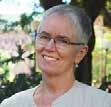
Synod Aligns its Focus to Mission Support
General Secretary, Rev. Jane Fry's announces changes to the leadership structure in 2024.
I'm writing to let you know about the upcoming changes to the leadership structure in 2024.
Neil King has been acting in the role of Interim Chief Operating Officer, in addition to his ongoing role as Executive Director of Treasury and Investment Services and CEO of Uniting Financial Services.
During this time, considerable work has been undertaken to review and discern the optimal structure for the Synod Office teams. As a result of this work, the Synod Board has agreed to a new leadership structure that we believe will set us up for sustained delivery and success.
In the new structure, there will no longer be a COO. Instead, two new General Manager roles will be created, with smaller, more focused teams.
The first new role is the General Manager – Services, Partnership and Delivery. This role will have oversight of the Risk and Compliance, Legal, People and Culture, and Finance and the Property Teams. They will work to streamline and develop the shared services functions and other services that we provide across the Synod. They will also assist and provide leadership in coordinating and developing major strategic projects.
The second new role is General Manager – Communications, Collaboration and Information. This role will have direct oversight over Marketing and Communications, Information Management, Information Technology, Board and Committees Management, Strategic Engagement and Services Relationship Management.

A NEW LEADERSHIP STRUCTURE THAT WILL SET US UP FOR SUSTAINED DELIVERY AND SUCCESS
The Communications, Collaboration and Information Team will work to align, lead and coordinate Synod Services messaging, communication and collaboration across all channels, systems and activities while also leading and developing an ‘Information Governance Framework’. This will
Synod Mission Services
ensure a coordinated strategy for the use and protection of all Synod information. It will also provide suitable, stable and safe technology solutions to support the Synod while assisting and providing leadership in coordinating and developing major strategic projects.
Both new roles will report to Neil King. This will allow us to continue to build on the excellent work of the last few months and creating new opportunities to collaborate across the Synod.
I'm very pleased to announce that Dan Andrew has accepted the role of General Manager – Communication, Collaboration and Information. Leanne Grant accepted the role as General Manager - Services, Partnership and Delivery and began on March 6.
In addition to the leadership structure changes, the Synod Leadership Team has also done some reflection on how our teams are named. As a result, we have made some changes to reflect our purpose better. We hope these changes will help us when we engage in our daily work.
In future, we will collectively be known as Synod Mission Services and will no longer be using the name Synod Office. Neil’s teams will now be known as the Mission Support teams. The Secretariat team name will remain unchanged.
The Mission and Education teams will now be known as Mission Resourcing while still retaining the strong Uniting Mission and Education brand.
insights 7
NEWS
Mission GLEN SPENCER Director of Mission Education PETER WALKER Director of Education & UTC Principal Communications, Collaboration & Information DANIEL ANDREW General Manager Services, Partnership & Delivery LEANNE GRANT General Manager Secretariat BRONWYN MURPHY Associate Secretary Moderator REV. FAAIMATA [MATA] HAVEA HILIAU
Mission Resourcing (UME) GLEN SPENCER & PETER WALKER Mission Support NEIL KING Executive Director Synod Mission Services JANE FRY General Secretary
Uniting Mission and Education: Mission Team Alignment to Future Directions

Director of Mission, Rev. Glen Spencer outlines changes to the UME structure to align with Future Directions.
Uniting Mission and Education is the Mission Resourcing division of Synod Mission Services.
Following Synod 2023, the Mission team began to reflect on how we might better align to the Future Directions and specifically the six core commitments. These discussions have led to an internal reorganisation within UME with the creation of a new team focusing on the commitments to ‘Living crossculturally as a multicultural, intercultural Church’ and ‘Stewardship of the Earth.
The Mission Enablement Team and Growth and Innovation Team have merged to focus on our commitment to working with Presbyteries to cultivate healthy congregations and to grow in discipleship, relationship, number, and impact.
Pulse and Saltbush will retain their focus areas that already closely align with Future Direction core commitments. Nathan Tyson, Director of First Peoples Strategy and Engagement, will join UME leading our Walking Together commitment.
In summary the Mission Team of UME will now look like this:
• Saltbush, led by Rev. Mark Faulkner with the key focus of reimagining ministry in and with rural and regional areas.
• Pulse, led by Mrs Joanna Drayton with the key focus of reaching and empowering people in the first third of their lives.
• First Peoples Strategy and Engagement, led by Mr Nathan Tyson with the key focus of walking together with First Peoples and to our covenant with Congress.
• Intercultural Ministry and Climate Action, led by Rev. Alimoni Taumoepeau holding responsibility for resourcing the church in our ongoing and active commitment to the Stewardship of the Earth and advocating for climate justice along with living cross-culturally as a multicultural, intercultural church.
• Mission, Growth & Innovation, led by Rev. Dr Cameron Eccleston. Working with Presbyteries to reorganize to promote growth in and through our churches, with the key focus of developing a flourishing blended ecology.

UNITING MISSION AND EDUCATION IS DEEPLY COMMITTED TO COLLABORATION – BOTH WITHIN UNITING MISSION AND EDUCATION AND ACROSS THE CHURCH. IT IS OUR HOPE THAT THIS ALIGNMENT TO FUTURE DIRECTIONS WILL BETTER SERVE THE WHOLE SYNOD AS WE WORK TOGETHER TO BECOME A CONTEMPORARY, COURAGEOUS AND GROWING CHURCH
8 insights NEWS
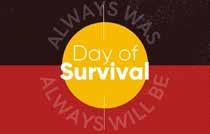
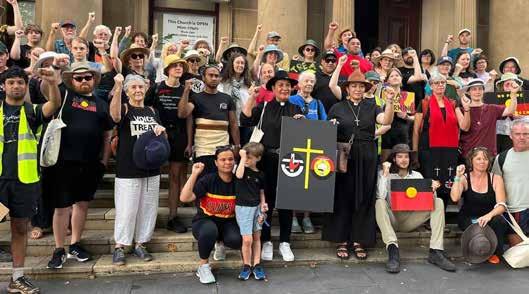

HEAR THE STORIES OF OUR FIRST NATIONS PEOPLE
A large contingent of UCA members supported the Invasion Day March on 26 January to march in solidarity with First Nations people.
The UCA marches with First Peoples on Invasion Day
In a post-referendum show of massive solidarity, tens of thousands turned out for Invasion Day rallies across Australia, standing firm in the belief that things need to improve for First Nations communities.
The 1938 Day of Mourning marked the beginning of the annual marches, protests and celebrations of our culture, history and people.
UCA members met at Pitt Street Uniting Church for a brief service of mourning and then moved out onto the streets. The Moderator, Rev. Faaimata Havea Hiliau marched and said as Church we are present to “hear the stories of our First Nations people and stand and march with them.”
ADRIAN DRAYTON
United Theological College hosts Bonhoeffer Congress

The International Bonhoeffer Congress has met every four years since 1968 and this year met in Sydney from 14-18 January. The theme for this years Congress was Crisis and Hope: Reading Bonhoeffer for Today.
The Congress is a gathering of scholars, activists, pastors and prayers from across the globe who admire the life and writings of German theologian Dietrich Bonhoeffer (190645), who is most famous for his book Cost of Discipleship and, sadly, his imprisonment and execution in a Nazi war camp.
Among those who attended the earliset meetings of the Congress were Bonhoeffer’s twin sister and his fiance. The 14th Congress was hosted in Sydney by United Theological College in partnership with Wesley Mission. One hundred and sixty people attended, spanning every continent.
There were lectures, seminars and conversations about all aspects of Bonhoeffer’s theology and the witness of his life and faith. The Congress focused especially on how Bonhoeffer’s theology, which was written in the context of emerging and then exploding authoritarianism and racism in Germany and across Europe, might help us grapple with the challenges of our day. Themes addressed included ‘Bonhoeffer and Climate change’, ‘Bonhoeffer and White Supremacy’, ‘Bonhoeffer and Incarceration’, and ‘Bonhoeffer and New Forms of Authoritararianism’. This was an extraordinary gathering with ideas, solidarity, struggle and celebration.
PETER WALKER PRINCIPAL, UNITED THEOLOGICAL COLLEGE
insights 9 NEWS
Meet the Mission Catalysts
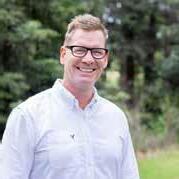

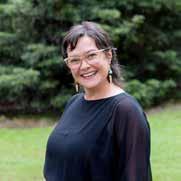
Uniting Mission and Education has announced that Rev. Dr Graham Hill, Rev. Dr Karina Kreminski and Linda Barclay will serve as Mission Catalysts in the Mission, Growth and Innovation team.
Rev. Dr Hill told Insights his role will be to focus on church planting and bringing renewal to established congregations. He brings a wealth of experience to the role, having previously worked as a minister, author, professional supervisor, and scholar of World Christianity, intercultural theology, and mission studies. He was formerly Associate Professor of the University of Divinity and principal of a theological college.
“Over the last 30 years, I’ve been involved in church planting, pastoring, theological education, professional supervision, and training people for ministry and mission,” he said.
“I’m the author of thirteen books and have four more coming out in 2024. My writings have been translated into Chinese, Korean, Arabic, Spanish, and Portuguese.”
“I love spending time with ministers and congregations, exploring new opportunities for mission, growth, renewal, and innovation. I also love planting new initiatives, and I’m excited about facilitating the planting of five new Uniting Church congregations in the next few years. It’s a wonderful privilege to serve with a passionate and gifted team and to see congregations serving people, experiencing renewal, planting initiatives and churches, and glorifying Christ.”
Rev. Dr Karina Kreminski said her role will focus on formation and faith communities or missional initiatives. Her permanent appointment comes after a year working as a consultant for the Synod.
“I am hoping to work closely with UTC on missional formation as well as refreshing the Missional hubs which we have been running for three years already,” she said.
“It will make formal what I feel my call has been for twenty years now- that’s to equip the churches for mission.”
Rev. Dr Kreminski said she was excited about putting into practice the blended ecologies paper presented at the 2023 Synod meeting, “Especially the focus on creating more faith communities as defined in the paper and unearthing the pioneers and creatives in our churches.”
“I’m keen to listen and learn in my first year primarily as well as pepper my role with a little bit of provocative thinking as a missiologist.”
Linda Barclay has joined the team in the role of Mission Catalyst-Strategic Support & Research. Her role provides support to new and existing missional activities across Synod. It involves working collaboratively with congregations, Presbyteries, and the UME team to gather information that can help inform growth activities and
projects. This includes local and regional data, National Church Life Survey (NCLS) reports, and internal Synod resources. “Bringing together various clusters of information can help shape and give focus to endeavours such as Growth Investment Fund applications, and I will be working alongside congregations and Presbyteries to support these submissions,” she said.
“The role also involves developing and implementing tools to carry out and evaluate missional initiatives, so we can continue to learn, share and discern together.”
“What I’m really looking forward to is getting to know many different congregations and Presbyteries that make up our Synod. Every context is different. Every congregation is different. Every person within those congregations is different. I’m looking forward to supporting our different congregations to tap into the nuances of their own context to explore what new missional opportunities might look like for them.”
Tash Holmes has joined the team on a permanent basis as Mission Catalyst –Uniting Creative and Rev. Ann Perrin will continue her work in Rural and regional ministry in a new role as Mission Catalyst – Rural and Regiona.
JONATHAN FOYE
10 insights NEWS
Longtime Lay Preacher Recognised
On Sunday 4 February, Kippax Uniting Church recognised Dr John Williams for 60 years as an accredited Lay Preacher. The congregation presented Dr Willians with a Certificate of Recognition as a Lay Preacher and a few books.
Dr Williams became an accredited Lay Preacher in his early 20s while he was studying at university in Sydney as part of the Methodist Church. Since then, he has been a regular preacher and worship leader across the Canberra Region Presbytery, the Synod of NSW and the ACT, and the Synod of Queensland.
Rev. Karyl Davison is a Minister at Kippax Uniting Church.
I first came in contact with John and his late wife in Biloela, Central Queensland,” she said.
“John and Ruth had volunteered to provide leadership in the Biloela congregation for a month: John leading worship and Ruth providing pastoral care. They were an amazing gift for the lay led Biloela congregation.”
“As Robbie Tulip comments on the Kippax Facebook page, John's "preaching is a privilege to hear for us at Kippax. Wrestling with how we can hold to a coherent faith in a scientific world is something that John has immense capacity to understand and share.””
Dr Williams is Emeritus Professor and research associate at the Australian National University (ANU). He is also a commentator on environmental matters and a founding member of the Wentworth Group of Concerned Scientists.
Kippax holds an annual service that celebrates transitions, such as into school, high school, college and university and other key milestones.
JONATHAN FOYE
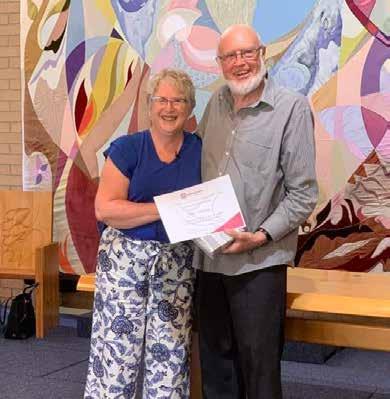
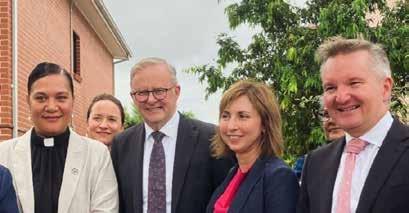
Sydney Alliance Welcomes Climate Campaign Win
In January, the Sydney Alliance welcomed an NSW Government commitment to put $87.5 million in funding towards social housing energy upgrades.
The NSW government says it will match an investment commitment made by the Commonwealth Government. The announcement also included $30 million to support renters to access clean energy and reduce cost of energy bills.
The Alliance made energy upgrades to social housing a key part of its election asks going into the March 2023 NSW election.
For eight years the Sydney Alliance ‘Voices for Power’ campaign has highlighted the need for access to a ‘solar garden’ community energy plot for low-income households, which will be funded as part of the federal government’s commitment to energy upgrades.
Cat Coghlan is Co-Lead Organiser of the Sydney Alliance. “Many homes in our state were built without minimum building and energy standards including the social housing stock,” Ms Coghlan said.
“This means that those homes are the least energy efficient and therefore the most expensive to run, yet people in those homes are the ones who can least afford and who can benefit most from energy upgrades and renewable energy.”
Moderator Rev. Faaimata (Mata) Havea Hiliau said that the current cost-of-living crisis was impacted by the cost of energy in Australia and a, “Clear demonstration of just how bad things can get when we don’t act meaningfully to tackle our climate and energy challenges.”
“In 2023 we saw temperature records smashed, last September was the hottest September on record, following the hottest August and hottest July globally – ever,” Rev. Hiliau said.
The Sydney Alliance is a coalition of community organisations, unions, religious organisations, and schools.
JONATHAN FOYE
insights 11
Jason John Inducted as Forest Chaplain

On Sunday 18 February at 2pm at an outdoor service on the grounds of Gleniffer Church, Gumbaynggirr Country, the Mid North Coast Presbytery inducted Rev. Dr Jason John into his role as Forest Chaplain.
Unusually for the Uniting Church, Jason will be inducted into a two year part-time (40 percent) placement. The Forest Chaplain role has been made possible through funding primarily from the Jan de Voogd Peace Fund (a Quaker bequest) and secondarily from the Synod Growth Fund. The placement builds on two years of work by the Forest Advocacy Ministry Committee, whose members hail from Sydney to the Queensland border, in an emerging rural ministry that is responsive to the needs of the community.
Jason is a deacon with a bi-vocational ministry – he also works as the coordinator of Bellinger Landcare – and has a strong commitment to the whole Earth community in the Bellinger Valley and wider area, having lived and served there for some 15 years. He has always felt that his calling as a deacon is to serve in environmental ministry.
Working with others in the Forest Advocacy Ministry, Jason will offer chaplaincy to forest defenders, support collaboration between groups working to protect the forests, advocate for the care of forests to reflect the unceded
sovereignty of First Nations Peoples as part of the Koala Chaplaincy project; bring people together to explore faith and spirituality and build resilience and joy in the face of the emotional toll of forest campaigning; and provide resources to support creation care in the Uniting Church and community. Jason will support the two regular faith gatherings – the non-denominational Gleniffer worship service and the outdoor Gleniffer Ecofaith Community.
The Forest Chaplain role begins at a crucial time. Following its election in March 2023, the NSW Government committed to establishing a Great Koala National Park on Gumbaynggirr, Dunghutti and Bundjulung lands. However, logging of critical habitat for koalas and other endangered species continues in the proposed national park area, and the pressures on forest defenders continue as they grieve the destruction and act to protect what remains. Pastoral support is needed now more than ever.
Rev. Jo Smalbil, Deputy Chairperson of the Presbytery, will lead Jason’s induction, and Gumbaynggirr Elder
HE HAS ALWAYS FELT THAT HIS CALLING AS A DEACON IS TO SERVE IN ENVIRONMENTAL MINISTRY
Uncle Micklo Jarrett and Rev. Dr Phil Dokmanovic, minister at BangalowByron Bay Uniting Church, will share reflections. The gathering will include forest defenders; other members of the Uniting Church, Gleniffer Church and Gleniffer Ecofaith Community; and people from other faith groups. All are welcome to join in this celebration.
DR MIRIAM PEPPER
See more information about the Koala Chaplaincy project here: www.unitingearthweb.org.au/ forests
12 insights
NEWS
UNITING CHURCH ADULT FELLOWSHIP (UCAF)
Fellowship News
Our year began with a wonderful Zoom Dedication Service. Special Guest for the Dedication was Moderator Mata Havea Hiliau who led the “Diversity in Unity” statement prior to the Commissioning. Her reflection gave each of us inspiration and encouragement for the year ahead.
NATIONAL UCAF CELEBRATION AND CONSULTATION RETURNS
Six members of the NSW and ACT Synod Committee joined other State Synod committee members and friends in Adelaide at the first National UCAF Celebration and Consultation since COVID-19 disruptions. We met at ”Nunyara”, a South Australia Uniting Church accommodation centre in the Adelaide Hills. Each day began with Bible study led by Rev. Mark Shultz with plenty of thought provoking to challenge us all. Each day featured special guest speakers on many topics as well as updates from each of the State Synod committees.
Assembly Chair Rev. Sharon Hollis was present throughout the week. The South Pacific Area President was with us and shared an update on what is happening in many of the Pacific Islands and the upcoming Area Conference. She outlined the new South Pacific Area program to train leaders in their Young Women’s Leadership Program. It is open to women involved and committed in their church who are aged between 18-30 years.
Rev. Peter Morek led us in a great session on “Caring for each other in Tough Times”, Rhonda Smedley shared “Living Well and Finishing Well” encouraging each of us to prepare for end times. We all received a booklet helping us to list and share our wishes now while we can before we are unable to do it for ourselves. The Gathering Worship Service in the Chapel was time to celebrate the lives of committee members each State had lost since the 2021 Consultation. We remembered Beryl Auld, Rev. Alistair Christie and Irene Roberts and their commitment to UCAF and the Synod Committee. Consultation followed Celebration and at its meetings a statement has been prepared:
At the 2024 UCAF Gathering in Adeleide it has been agreed that we would inform the Uniting Church Assembly Standing Committee that we have begun the process to conclude the ministry of the UCAF National Committee, effective from 30 June 2024. UCAF Synod Committees and UCAF groups will continue to operate across Australia.
GREETING CARDS
Rev. Noreen Towers has been busy with a friend Kay creating many attractive designs for greeting cards and framed inspirational messages. They will be great for pastoral outreach and will be available at our Gatherings and Gettogethers.
WORLD DAY OF PRAYER
World Day of Prayer prepared by Palestine will be held across churches Friday 1 March, please try and attend an event in your area.
Appreciation certificates are available from Laraine Jones. Please save your stamps.
If you would like to share your fellowship news or have any questions, please contact Judy Hicks: judyh_rnh@hotmail.com

insights 13
Resurrection How the Changes Everything
If you were pressed to find one image that encapsulates Christianity, most people would probably think of the cross.
And yet, while the cross is certainly a central theme in the story of how God saves us, it is one aspect of a greater story.
Yes, Jesus died for our sins. But even more than that, He lived— that we might live with Him. And Christ’s resurrection is the inaugural event of the new creation. Paul even goes so far as to say in 1 Corinthians 15:17, “And if Christ has not been raised, your faith is futile; you are still in your sins.”
So, if the resurrection is the real crux of our faith, what does it mean to live in light of the resurrection?
In his book Surprised by Hope, N.T. Wright notes, “The point of the resurrection … is that the present bodily life is not valueless just because it will die … What you do with your body in the present matters because God has a great future in store for it. What you do in the present—by painting, preaching, singing, sewing, praying, teaching, building hospitals, digging wells, campaigning for justice, writing poems, caring for the needy, loving your neighbour as yourself—will last into God’s future.”
As resurrection people, we must stand and speak up on matters of justice to bring the resurrection life Christ offers to those who need it most. Whether you get involved locally or go overseas, the oppressed and their needs matter in the economy of heaven. Pursuing justice can be as simple as our choices as consumers or being involved in groups that fight against systemic injustices.
The point is, if we are living in light of a coming Kin-dom, we should be working to bring some type of alignment between the world as it is and the world as it will be. N.T. Wright reminds us, “[God] alone will make the “new heavens and new earth,” yet this is not an excuse for inaction on our part. We have a responsibility as resurrection people to work for the coming Kin-dom in the here and now.
CHRIST INVITES US TO JOIN HIM IN HIS WORK OF SERVING AND BLESSING OTHERS
In other words, the resurrection changes everything. The Kin-dom of God is here and yet it is coming. God has chosen His resurrection people to be change agents in their culture; to proclaim this coming Kin-dom through how they live, relate and work.
Living as resurrection agents bringing in the new Kin-dom may seem like a high task for most of us who are in the thick of jobs, family, bills, and endless to-do lists. But there are a few ways we can make the intentional but simple choice to proclaim God’s promise for us.
Repentance and grief are a strange first step for living in light of the resurrection, but an important one, nonetheless. The season of Lent can lead us in this process of reflection. Though it may be a painful step to living life in light of the resurrection, it is also an opportunity to draw on God’s power for transformation. This is a chance to, with the help of the Holy Spirit, examine our lives and how the decisions we make affect others. Humbly asking for forgiveness can be immensely powerful in opening relational doors that have been slammed in the past.
As resurrection people, we cannot bask in the light of life to the full while others stand by in desperate need. People made in the image of God are suffering from injustice all over the world and in our own community. And when Jesus walked on earth, He made is His mission to love and serve them.
Life seems to come at such a rapid pace that we find ourselves trying to speed through these intersections with friends and acquaintances rather than intentionally stopping to take in the rich opportunities they provide. Living in light of the resurrection means we realise and make choices on the basis of the new creation rather than the lacklustre hues of mundane existence. Easter is about new life, and historically, it was a time when new believers draw together as the body of Christ. Every day we meet people with whom we can share genuine hope and enter into their struggles. Jesus was always entering into new relationships as He travelled with the disciples. Christ added value to people who had nothing to offer Him in return and He still does today. And today, He invites us to join Him in His work of serving and blessing others.
We can add value to people by building relationships with those people we see every day on our way to work, in our office, in our neighbourhood or wherever we meet them. You don’t have to force a deep conversation, just treat them with respect and dignity, which can go a long way even in passing.
Resurrection is not an afterthought in the story of our salvation; it is the defining moment of our re-creation. Resurrection says, “The Kin-dom is coming!” As we approach Easter, let’s challenge ourselves to live in light of the promise of being brought back to life with Christ.
ADRIAN DRAYTON
14 insights
LIVING IN LIGHT OF THE RESURRECTION MEANS WE REALISE AND MAKE CHOICES ON THE BASIS OF THE NEW CREATION RATHER THAN THE LACKLUSTRE HUES OF MUNDANE EXISTENCE
insights 15

&
Gifted Called
The Uniting Church has a process for people in ministry to discern God’s call on their lives. The Period Of Discernment, however, is not confined to ordained ministry. What does it mean to be ‘called’? And how does the church go about deciding? This issue, Insights explores the concept of ‘calling’ for both ordained and lay ministry.
16 insights
Gifted & Called: The Expanded POD Discernment Retreat 17 19 20 22 26 28 Practicing Faith Through Discernment Why (Not) Rush Phase 2 Formation Exit Candidates & Faith Journeys Formation, Leadership and Ted Lasso
Expanded Period The of Discernment
Paragraph 13 of the Basis of Union has long been one of my favourites. At its heart is the belief that all of us are gifted and all of us are called.
Based closely on the words of 1 Corinthians 12 which explores the metaphor of each of us as individually gifted members of the one body, this paragraph reminds us of the diversity of our gifts, and that there is no gift without its corresponding service.
It is the idea that each one of us has gifts, talents, and capacities, and in turn, every one of us is called to use those gifts to serve God in the Church and the world.
It would be convenient and easy if we believed that only a few are called to ministry –those perhaps who are called to capital m, “Ministry.” It would let us off the hook then, wouldn’t it? If we could leave ministry to those called to lead from the front? And yet, this is not what we purport as a church. We affirm that all of us have a part in the ministry of Christ, all of us are gifted and all of us are called. Not only this, but also that we will order our life as the church in response to God’s call. This is why we are expanding the Period of Discernment as a congregational tool for all members of the Uniting Church. The PoD has developed a bit of a reputation as being the pathway (or gateway) towards ordination. Unfortunately, this has meant that many do not even consider the idea of doing a PoD because they don’t sense a call to Ministry-leadership. This has meant they have not engaged in the rich support of a PoD for their own journey of discernment of what their gifts are, and how God might be calling them to use these gifts in the church and the world.
I wonder when the last time was that you considered what your gifts are, and what God is calling you to do with these gifts in this season of your life? Perhaps now is a suitable time for you to consider a PoD. Are you entering a new season of life, feeling unsettled or directionless? Are you finishing school, entering retirement, returning to work after parenting young kids, or working out how to keep being you and a parent at the same time? Are you new to church and curious about how you can serve your congregation with the gifts you have? Are you wanting to enrich your current career with a deeper sense of mission?
Wherever you are in your life at the moment, a Period of Discernment is an enriching support for your discipleship journey.
The newly shaped PoD leans much more into discernment rather than the previous model of learning. You may choose to do some study or workshops, but it isn’t a requirement. At its core, the PoD is an intentional action-reflection process, where you will engage with intentional discernment and then reflect on this with a mentor. There is also no set time limit for how long or short this needs to be.
Whilst we all are on a journey of discernment as disciples of Jesus and pilgrims on the way, the PoD enables us to engage with a community of discernment, with a mentor, our Congregation, Presbytery, and the Synod, so that we are not alone but rather discern in community.
CONTINUED ON NEXT PAGE >
insights 17
&GiftedCalled
Expanded Period
The of Discernment

A few of the other new offerings in the PoD space include:
• Discernment Retreats: look out for the dates of the next retreat. This is a wonderful way to start the year with a time of pause and reflection.
• Cohorts of Podders (collective noun for those doing a PoD!) who connect over Zoom and share the journey together
• A dedicated Phase One program for those doing a PoD who do wish to explore leadership gifts and potentially a pathway to formation for ordination.
• A quarterly newsletter to all Presbytery PoD representatives, mentors, and Podders with up-to-date information about discernment offerings and resources (email Pod@nswact.uca. org.au if you would like to receive this newsletter).
• The invitation for groups to do short PoDs together – a church council, PRC, worship team or the like, who wish to explore what their individual and collective gifts are, and how they can work together to use these gifts to serve most effectively.

For all the up-to-date information about the PoD, including the handbook see: www.nswact.uca.org.au/resources/period-ofdiscernment-information
If you have further questions, email: pod@nswact.uca.org.au
18 insights
REV. GREER HUDSON

Discernment Retreat
“AN EXPERIENCE OF THE HEALING POWER OF TEARS, LAUGHTER AND MOVING MY BODY”
TThe rest of the Centre for Ministry was quiet, many staff on annual leave and the College year not yet begun. And yet, the auditorium was abuzz with that special kind of sacred energy that arises when people gather for a retreat. his was the inaugural Discernment Retreat, held in January 2024, to begin a new year. Most of the 16 participants were people engaged with a Period of Discernment. Others simply came with an openness to what God might be calling them to for the year ahead. Most didn’t know what they were in for.
Over the three days, participants were invited into a variety of practices to facilitate discernment. Some were familiar and expected: worship, prayer, silence, journalling, meditation. Some were less familiar: creative practice, embodied journalling, storytelling, labyrinth walking, movement. It can be challenging to try new things in our discipleship practice, and yet, sometimes we need to find new ways to be open to the voice of God, so that we can hear new things.
Some participants shared that if they had known what we were going to do, they might not have come, BUT they were so glad they did, because what they discerned by engaging in these different practices was “profound” and “life changing!” One participant stated: “If you’d told me I’d enjoy dancing on a bright, hot sunny day in a room full of strangers, I’d have said you were dreaming. But using my body like that gave me access to various aspects of my mind and made journalling a whole-of-mind experience.”
As the facilitator of this retreat, I found unexpected discernment blessings for myself as well. It was, as it often is, a joy to hold space for a group of people to enter in, to explore, to be open to the surprising work that God is doing in and through us. More than this though, the retreat revealed to me the very things I tell people about all the time in the discernment space – that when we serve from our gifts, there is life!
leadings God was giving to me, I found so much life and energy. It didn’t exhaust me and wipe me out. It energised and encouraged me. Isn’t it great when God teaches us the very lessons, we are seeking to teach others!
WE INVITED OUR BODIES, NOT JUST OUR HEADS, INTO A SPACE OF OPENNESS TO THE VOICE OF GOD
I made some intentional choices in my leading of this retreat that enabled me to lead from my gifts. I had initially drafted a retreat program that seemed “good” – more of what the participants were expecting. And then I heard that familiar little whisper that said, “What if you did this?” This involved more creative, embodied practices – the kinds of thing I love to do in my own spiritual practice. The internal critic was loud at that point, suggesting it would be “too much” and not to everyone’s liking. And yet, I listened to the whisper. I leaned into it. I realised that inviting others into a wider variety of practices was exactly what God was calling me to do. I trusted this – and thankfully, the retreat group trusted it too. Gently, incrementally, and always by invitation with a whole variety of options, we played.
We invited our bodies, not just our heads, into a space of openness to the voice of God. And for me, leading from this place, trusting the giftings and
Each of us has God-given gifts and each of us is called to use our gifts in ministry. This is certainly not limited to those who are called to ordained ministry. This is about every one of us, as members of the body of Christ. Therefore, the discernment of our gifts and calling is an activity for each one of us as well. I invite you, as we begin a new year as members of the one body, to contemplate the gifts God has bestowed upon you… What are you good at? What brings you joy? Where is there energy and excitement, passion, and drive? What have others seen and affirmed in you, and what do you know to be true for you?
And how might God be calling you to serve this year? Is there an issue, a group, a church, that is on your heart? How have you been placed to serve God by serving others, in your home, church, workplace, community? What can you say yes to in this season of your life (and what might you need to say no to in order to enable this)?
Perhaps you will join us for our next Discernment Retreat, for an intentional time of stepping out of the hustle and bustle of life, to discern, reflect, and be open to the voice of God in your life.
REV. GREER HUDSON
insights 19
If you are interested in learning more about discerning God’s call in the UCA please visit: ume.nswact.uca.org.au/resources/period-of-discernment-information
Practicing
Faith
Discernment Through
20 insights
Faith Discernment
The word ‘discernment’ gets thrown around in the church quite a bit. But what do we actually mean when we say ‘discernment’?
Discernment has to do with how we make decisions about the bigger questions of life. These questions might be: what might our working life look like? Is there a vocation we might be called to? How can I put my skills, gifts, and passion to use in the world?
There are also communal questions to think about. A community might engage in the practice of discernment as they consider questions like: who will offer leadership within the congregation? What is the shared identity of their particular church community? How might they live that out together faithfully to serve God in their local community?
The practice of discernment has much to do with listening – listening to the questions being asked, listening to those around us, and most importantly listening for God’s voice, listening for the Spirit’s movement. Discernment involves a deeper listening and a willingness to hear and to respond, even when it might be challenging for us to do so.
Discernment is a way of becoming alert to the activity of God in the world and aligning our own activity with the dream of God for the whole creation. Frank Rogers* talks about discernment as an intentional practice by which a community or an individual seeks to recognise where God is active in the world. Then the community tries to work out how they take part in that activity. He talks about the practice of discernment as an intentional process of reflection and participation with the Spirit of God.
The communal practice of discernment] orients the conversation and imagination of communities toward participation in God’s activity by inviting members to share in the goal of that activity: the new creation.
Frank Rogers
Discernment is both an individual practice and a communal faith practice. It invites us to engage our prophetic imaginations and draws us into full participation in God’s dream for the kin-dom. It offers us a framework that provokes our listening, inspires us to understand our identity more clearly, and gives us opportunities to align our vision and activity with God’s dream for the kin-dom. Discernment is a process of opening our eyes, ears, minds and hearts to expand our view of God, as well as where we might best join God’s activity in the world.
Discernment requires us to stop and think deeply about who we are called to be, first of all. Then, discernment requires us to think about what God might be calling us to do.
The practice of discernment helps Christian disciples to be intentional about turning attention to God and to God’s activity in the world. Discernment draws us into the invitation to participate in God’s transforming activity in the world.
REV. NICOLE FLEMING
DEAN OF CANDIDATES AT UNITED THEOLOGICAL COLLEGE
*Frank Rogers, ‘Discernment’, chapter 8 in Practicing our Faith: A Way of Life for a Searching People, ed. Dorothy C. Bass, 2nd edition, John Wiley & Sons, 2010.
insights 21
&GiftedCalled
Why (not) Rush Phase 2 Formation?


22 insights
One of the first questions I’m often asked by people engaged in Period of Discernment (PoD), or those applying to become a candidate for Ordained Ministry is: “How long will it take?” People ask this question in a variety of ways; “Can I finish earlier?”, “Why do I need to do three years in Formation?” or “Why can’t my previous experience in ministry/study in theology be counted?”
My answers to these questions are mostly welcomed with some relief - you may not need to do three years in formation, and your previous experience in employed ministry roles and study of theology can be “counted.” After a number of years of these conversations I’m left wondering how this, almost resistant, culture to engagement around formation for ordained ministry has emerged, particularly among anglo-Australian candidates?
One might also ask, why bother with a Phase 2 Formation program for ordination at all if we have a large percentage of candidates with previous theological study and experience in employed ministry roles within the Uniting Church?
We have Phase 2 Formation (formation for ordination) because our theology of ordination in the Uniting Church recognises that God calls and sets aside some members of the church for the particular ministries of the Diaconate and the Word. The Uniting Church has taken seriously the need to prepare these people well for these ministries.
As outlined in the Assembly’s Statement on Ordination, Ordination sets people aside in a new relationship with the whole church (not simply the Uniting Church) and with others in the body of Christ. Ordination is usually for life and holds particular responsibilities that are outlined in the Basis of Union:
These will preach the Gospel, administer the sacraments and exercise pastoral care so that all may be equipped for their particular ministries, thus maintaining the apostolic witness to Christ in the Church. Such members will be called Ministers, and their setting apart will be known as Ordination.
To be ‘set aside’ is to enter into a new relationship with God, with the Church and with the other members of the body of Christ. The Statement on Ordination explains that this setting aside for ordained ministry, “involves focussing, modelling, supervising, shepherding, enabling, and empowering the general ministry of the Church.”
The Phase 2 Formation program assists those to be ordained to develop a deeper understanding and appreciation for what being ‘set aside’ (for life) might mean: What does it mean to enter this new relationship with the church? What does it mean to ‘safeguard the apostolic faith’? What does it look like to hold particular responsibility for ‘reconciling and gathering’ and ‘dispersing and reforming’ – for leading the church in its ‘worship, witness and service’?
One of the tasks for the faculties of the theological colleges across the Assembly, is to provide intentional ways for those candidates to integrate their previous study in theology and experience in ministry into their growing understanding of what it means to become (be) an ordained minister, set aside within the Uniting Church for God’s work in the world.
Each college will have its own way of addressing this. When those with previous theological study and/or experience in employed ministry join the Phase 2 program at United Theological College (Synod of NSW and the ACT), we actively encourage and support those students to integrate those experiences and that study into an understanding of who they are becoming as an ordained minister.
FORMATION OCCURS IN RELATIONSHIP WITH GOD AS WELL AS IN RELATIONSHIP WITH OTHERS
The Assembly Guidelines for Theological Education and Formation: Phase 2 for Ordained Ministries, suggests the Church envisions education for [ordained] ministry in the following way:
The Church envisions Education for Ministry which will:
I. foster the centrality of the Scriptures in the life of the Church and the work of ministry; as described in the Basis of Union;
II. inspire the participation of the people of God in the mission of God revealed in Jesus Christ by the Holy Spirit;
III. strengthen resilience, passion and competence for ministry in multicultural and multifaith contexts of the 21st century;
IV. stimulate lifelong learning and formation in the Christian life for all people;
V. celebrate the shared ministry of the whole people of God;
The Standards also set 14 attributes to orient the Phase 2 programs designed and implemented within each Synod. Along with the other theological colleges across the Assembly, United Theological College (UTC) takes seriously these attributes. In order to form candidates in these attributes, UTC has shaped a program that supports each candidate to deepen their theological understanding and spiritual life, further develop their gifts and skills for the practice/s of ministry as well as their ability to reflect on their study and ministry experiences and integrate those into their ministry practice, increase their cultural awareness and cultural competency, and expand their understanding of themselves and who they are/ will be in ministry.
CONTINUED ON NEXT PAGE >
insights 23 &GiftedCalled


Yet, Phase 2 Formation is not simply about academic education and learning the practices of ministry. We talk about formation as a spiritual discipline that is more of an art than a science. Formation occurs in relationship with God as well as in relationship with others. Peter Walker, Principal of UTC, has suggested the task of formation is fourfold in which candidates for ordained ministry are invited to participate in a process to:
Inform our minds with Gospel imagination and theological wisdom.
Reform our gifts into an offering to the mission of God.
Transform our wounds into strengths for ministry.
Conform our lives to the way of Jesus Christ.
When we understand formation in this way, we can appreciate that, while formation occurs in community, it is unique to each person. As a result, a certain flexibility is required within our Phase 2 formation program. We have developed a culture of ‘flexible pathways.’ While there are commonalities across candidate programs, each candidate has a program designed specifically for them, considering the study and experiences they bring. For example, some of those candidates with prior ministry experience are given specific integration projects. Other’s may complete less field education or have a lighter academic load. Some candidates are engaged in ‘Regional Formation’ where they remain located in regional or rural areas and participate in the Phase 2 program in distance mode. For a number of years, we have offered paid ministry practicums where candidates are able to complete their field education while receiving financial support. Of course, there is more work the college can do in further developing these areas of the Phase 2 program.
Alongside this, there is a kind of internal ‘formation’ that is expected to be engaged in any Phase 2 formation program. These internal aspects of ‘formation’ can be a harder thing to pin down. However, we can understand this area of formation through the formative work we have already experienced through our relationship with God, the one who forms us in our mother’s womb.

24 insights
We must also understand that Phase 2 Formation involves the development of character suitable for representing God and representing the church.
This internal, integrative work in the Phase 2 formation program has to do with deepening one’s relationship with God, deepening one’s spirituality, deepening self-awareness, and deepening the way in which one relates to others. It has to do with developing the disposition of a life shaped for the ministry of Christ.
This is often much more demanding and difficult work for candidates than the other aspects of the program. It can be incredibly challenging because it sometimes asks that candidates deconstruct their theology as well as previous patterns of behaviour in order to bring those into new ways of being and relating. It is also often work those who have been engaged in employed lay ministry work or previous theological study have not been expected to do in such a formal and

I WOULD ENCOURAGE ALL CANDIDATES TO BE ACTIVE PARTICIPANTS IN SHAPING THEIR PROGRAM , LOOKING FOR OPPORTUNITIES TO GROW IN THEIR CHARACTER AND SPIRITUALITY
WE CAN UNDERSTAND THIS AREA OF FORMATION THROUGH THE FORMATIVE WORK WE HAVE ALREADY EXPERIENCED THROUGH OUR RELATIONSHIP WITH GOD, THE ONE WHO FORMS US IN OUR MOTHER’S WOMB
intentional manner. It may sound a little unfair or harsh to those candidates who do have those previous experiences of ministry work and theological study, however in my experience it is often those candidates who struggle most with this deeper aspect of Phase 2 formation.
I would encourage all candidates to be active participants in shaping their program, looking for and suggesting opportunities to extend their experience, develop their craft and grow in their character and spirituality. In doing so, I wonder if those candidates who enter Phase 2 Formation with previous theological education and experience in ministry might feel less frustrated. I wonder if they might see this time as a gift rather than a burden, from the start of their formation program?
I have noticed that it is most often in the second half of the Phase 2 program that something clicks for candidates in terms of ‘formation’. Because of this (unresearched) pattern, I would argue that a 3-year program of formation is necessary for most candidates. Of course, there are some candidates who enter the Phase 2 program with a high-level self-awareness and a deep maturity of faith and relationship, as well as extensive experience in ministry. If those candidates are deemed ‘ready for ministry’ in their second year of the program, then we should support them moving toward ordained ministry at that stage.
The specific integrative ‘formation’ aspect of Phase 2 requires openness and maturity. It requires a willingness to enter wholly the formation community with other candidates, with the college faculty and with other experienced ordained ministers. It is a task that often challenges who one is in a deeper way as it provokes candidates to think more deeply about their be-ing – who they are in God, where are they located in relation to the mission of God, how their gifts might best serve the church, who they are in relation to others and how they enact those relationships.
It also challenges candidates to work on areas that need to be raised into their self-awareness and then addressed in order that they might engage in ministry respectfully, consciously, and safely. This is often much harder work than an academic program or learning the practicalities of ministry. But it is important work, life-long work, that is essential for any of us who might be set aside for ordained ministry within the life of the church.
REV. NICOLE FLEMING
DEAN OF CANDIDATES AT UNITED THEOLOGICAL COLLEGE
This article was originally published as part of the Assembly ACT2 Theological Culture project. It has been edited.
insights 25 &GiftedCalled

Natasha He
How did you find your Phase 2 experience and how do you think it has prepared you for ministry?
Through my time in Phase 2, I’ve grown and evolved to gain a more diverse and inclusive understanding of faith. The impact on my personal growth and intellectual development cannot be understated. I’ve been confronted with challenging and inspiring topics that have expanded and stretched my knowledge and understanding of theology. The resources available to me, from esteemed lecturers to knowledgeable colleagues and the vast collection at Camden Theological Library, have been an extraordinary asset to my journey. It has truly been a valuable experience that equips me for ministry.
How did your theological study inform your field education experience?
Theological study is closely related to field education. Our academic studies equip us with the necessary knowledge to face the challenges of field education. We build our foundation on the scriptures and the history of the church. We then apply this knowledge to develop our ministry practices and improve the way we serve others.
What are your hopes for your ministry within the Uniting Church?
I have a deep desire to serve God’s people wherever I am called. My purpose is to share God’s Word and light through prayer, encouragement, and love. I am here to serve, not to be served, and I will continue to strive to be a source of hope for those around me.
How did you find the ACOMP process?
As an exit candidate, I felt a sense of uncertainty about what to expect and how ACOMP would receive me. However, I am pleased to say that it turned out to be a constructive and positive experience. I am grateful for their wisdom and insight.
2 Exit candidates speak about their experience
Tui Waqanibaravi
How did you find your Phase 2 experience and how do you think it has prepared you for ministry?
The field placements were a great help in that I was able to engage with different cultures within the UCA. In my practicum I served in a Tongan, an Anglo and a multicultural setting. The pastoral demands were different in each and it was heartwarming to be received in each of the congregations. The intentional shift towards a multicultural uniting church is an overwhelming witness to what the UCA aspires to be
How did your theological study inform your field education experience?
The theological studies were in depth and wide in its sourcing that it helped in my transitions from congregation to congregation. It assisted in allowing me to engage in a theology that was relevant to each congregation. For example we learn that Christology is shaped by the context, the journey, the hopes, the struggles of the congregation. In the learnings I was able to observe the Christologies through the worship and prayers and I prepared my liturgies accordingly. The congregations loved the responsive liturgies as it spoke into their daily encounters.
What are your hopes for your ministry within the Uniting Church?
My hopes are for the Multicultural Church to understand and embrace the abundance it has in its diversity. Imagine the wedding banquet in Jesus’ parables and how we all meet in the center bringing with us the best that each culture has to offer. Being one that loves my food, I imagine the pallets dancing to the different flavors and appreciating the talanoa to each dish that is on offer. The wedding banquet is a collage of conversations, of arrivals, discovery, hospitality and courtesies. Each, telling their stories to their rhythms, acquired through the uniqueness of their rich divine experiences.
How did you find the ACOMP process?
Being my first ACOMP process I thought it was brief. The College had prepared me well for the process and there was a bit of anxiety towards it. But it went by without much hiccup and was over before I could panic. The 3 interviews were well organised and the conversation flowed easily. The excitement in the room could not be concealed as the collectives in the panel went about uncovering our similar passion for a functioning multicultural church tailored to the changing geopolitics of the Parramatta region.
26 insights
Different Gifts, Different Service
Ever wondered how your unique gifts could be a blessing to others in mission and ministry? Here are a few of the many faces of our church who are serving where they are with what God has given them. May it be a blessing and an inspiration.

HEATHER PRICE
Current ministry: Music ministry at Adamstown Uniting Church (Hunter Presbytery)
What you love about being involved in this ministry: We have had lots of people come forward to join in with music at the church over the past 12 months. We have quite a few younger people joining our intergenerational band.
What you find most challenging: Finding enough music with inclusive language! We are working hard to find new songs that we love to sing that allow all to feel welcome and relaxed in our services.
What you are looking forward to in your ministry in the year ahead: I have been the band leader when our younger musicians are playing, but it is my hope that as we are all getting to know each other so much better now.

REV. TAY LEE
Current Ministry
Position: Minister of Brunswick and Tweed Valleys Uniting Churches, Far North Coast Presbytery Partnership
What you love about being involved in this ministry: The Bible says that faith, hope, and love remain (1 Cor 13:13). I can freely share these key things from God. This is the number one reason why I like being a Minister of the Word.
What you find most challenging: My least favourite thing is spending too much time at my desk. I often find myself struggling, jumbling, and juggling to prepare a message. I need to maintain my physicality as well as my spirituality.
What you are looking forward to in your ministry in the year ahead: I want to see each generation respond to God’s invitation. I look forward to different generations coming to church to worship, pray, and have a break together.
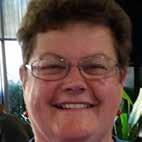
SHELLEY MAREE FORREST
Current ministry: I am a member of Broken Hill Uniting Church and a lay leader, chair church council, musician (guitar) and singer, assisting with technology.
What you love about being involved in this ministry: Loving those in my congregation and receiving it back and sharing my gifts with like-minded people and learning from the diversity of the gifts we share.
What you find most challenging: Not having someone in placement with whom to discuss issues, however there are many experienced members in the congregation including pastor David Shrimpton (Flying Patrol) with whom I can.
What you are looking forward to in your ministry in the year ahead: I would like to do more courses regarding mission and perhaps funeral training as well as using a number of intergenerational resources which have been provided to enhance our life together.
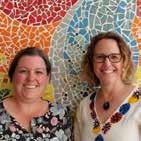
CECILIA RUSSELL (CEC) AND EMMA CHAPMAN*
Current ministry: Faith@5 is a combined activity of Jesmond Park Uniting Church and new Lambton Uniting Church in the Hunter Presbytery. Faith@5 runs on Saturday from 5pm.
What you love about being involved in this ministry: We have developed a space where kids, teens, and their adults feel connected, are allowed to ask questions, and enjoy each other’s company.
What you find most challenging: A few things: the time and energy Faith@5 takes - alongside day jobs, and looking after our teens.
What you are looking forward to in your ministry in the year ahead: Finding ways to share leadership with a larger group, maybe including our teens.
insights 27 &GiftedCalled
Formation, Leadership and Ted Lasso
I am late to the Ted Lasso party. Until recently I didn’t realise what I was missing. Just like Ted I know almost nothing about football. Although I do spend a lot of time thinking about leadership, how we form those training for ministry in leadership for the church context. We could do worse than looking toward Ted Lasso for some inspiration here.
Spoiler alert – for those who haven’t watched…Ted Lasso leads others with care as well as a genuine interest in who they are and what they might offer. He is authentic, vulnerable, and flawed. He isn’t perfect. There are significant moments of human frailty and anxiety displayed in Ted’s persona. Yet he is a believable and incredibly likeable character.
People matter to Ted. It seems that he is all about relationships. Genuine interest in people and their lives is a clear foundation for his leadership. Think about those ‘biscuits with the boss’ sessions, or how he continues to turn up at the local pub even though he gets harangued by the Richmond fan base when he is there. He asks the team what they need and fixes the easy things first – water pressure in the shower. Ted learns people’s names and notices them. He takes their ideas seriously and gives credit where credit is due. Simple things done well.
GENUINE INTEREST IN PEOPLE AND THEIR LIVES IS A CLEAR FOUNDATION FOR HIS LEADERSHIP
In her book ‘Leading Mindfully’, Sinclair suggests that leadership that is authentic is valuable when it has integrity and holds to honesty, when relationships based on trust and respect are held that assist the group to recall its values and purposes, when it offers support and inspiration, and when one is able to offer leadership in ways that draw on one’s own values, experiences and being.
Isn’t this exactly what leadership should look like in the church? The kind of leadership that desires for people to flourish, listens deeply, is compassionate, is able to collaborate with others, is clear when necessary, and is genuinely authentic.
In our formation for leadership within the church, we would do well to place a high regard on relationship as a basis for authentic leadership. Relationship with those who we lead. Relationship with those we are led by. And in particular, upon our relationship with the One who is our love and our insistent hope (not Ted Lasso), Jesus the Christ.
Ted doesn’t need to win. In fact, for Ted it’s not about winning or losing it’s about supporting and guiding the players to be “The best versions of themselves on and off the pitch.”
Ted leads with love and with insistent hope. Ted is what we might call an authentic leader.
Amanda Sinclair, an Australian researcher in leadership and change, suggests that authenticity does not occur solely within the leadership of the individual. Authenticity, she suggests, occurs in relationship, in the interactions between leaders and those they lead.
Although I spend a lot of time thinking about leadership and how we form those training for ministry in leadership, we could do worse than looking to Ted Lasso for some inspiration here.
REV. NICOLE FLEMING
DEAN OF CANDIDATES, STUDENT SUPPORT, UNITED THEOLOGICAL COLLEGE
All seasons of Ted Lasso are streaming on Apple TV with a subscription.

28 insights
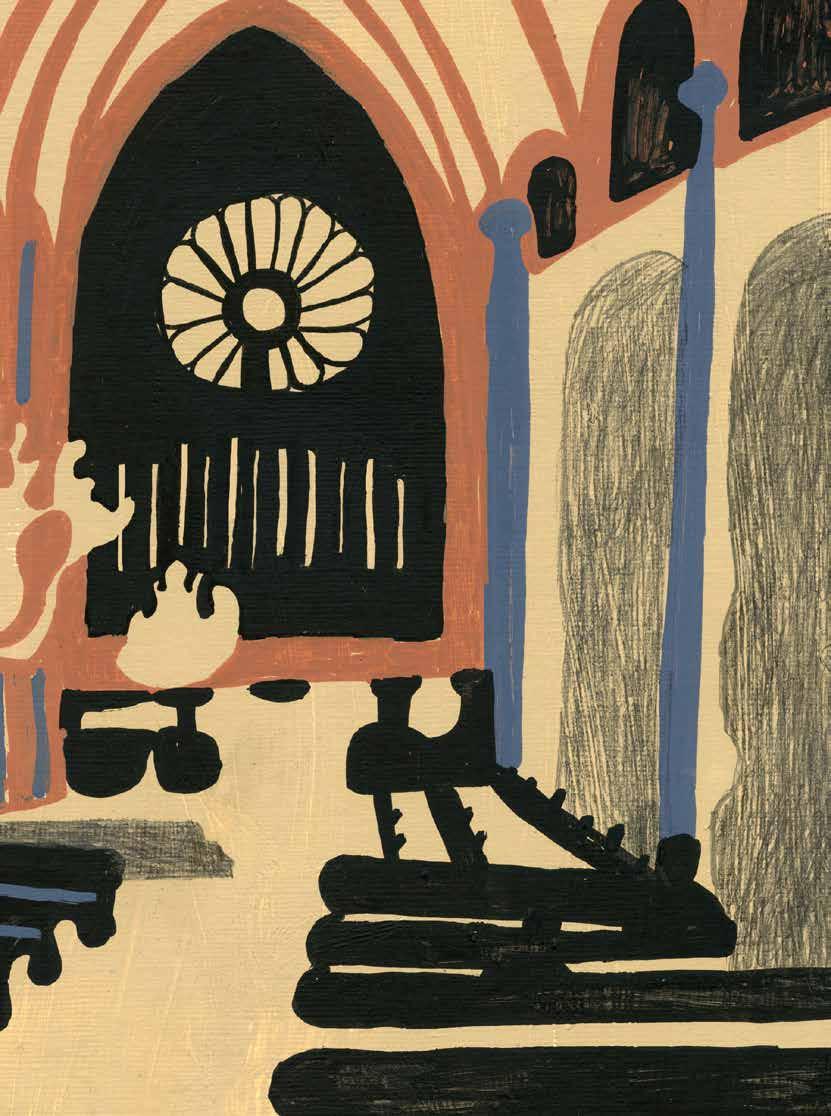

insights 29 &GiftedCalled
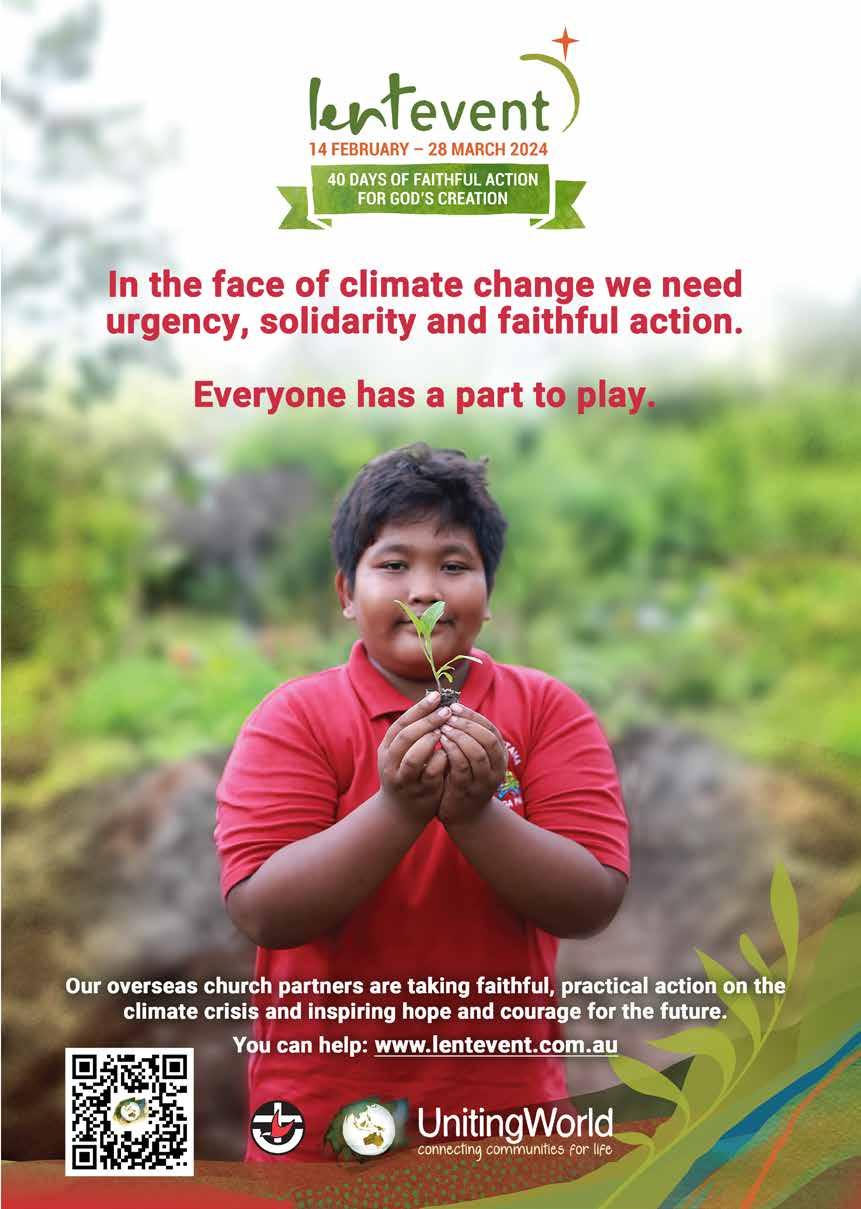


Synod The Growth Investment Fund
Discipleship, Relationship, Number and Impact
The Synod seeks to support a small number of projects each year through the Synod Growth Investment Fund that will help the Uniting Church grow in discipleship, relationship, number and impact. It gives congregations the opportunity to apply for funding to support growth and to inspire genuine renewal.
The Synod Growth Fund is supported through the Seeds of Growth contribution made by Congregations and Presbyteries. God is calling us to become a contemporary, courageous, growing Church proclaiming Jesus Christ in worship, witness and service. This is the vision statement from the Future Directions which will guide the Synod into the future.
Over three rounds of funding the Synod has committed $3.5 million in Growth Investment through the Growth Fund.
As part of the ongoing refinement and improvement of the Growth Fund processes, we are changing the Growth Fund to have a more intentional and strategic approach to investing in the future of the church. In 2024 we are offering three levels of Grants >

Missional Grants
Up to $10,000 available to congregations as one-off grants for missional activity.

Up to $100,000 available over 2-5 years for exploring new ways to do church.

Innovation Grants Strategic Grants
Up to $500,000 over 5 years for strategic congregations or initiatives focused on growth and aligned with Future Directions. This must be supported by Presbytery.
Read further to find out more about each grant opportunity.
For more information and relevant application forms for these grants, email: growth@nswact.uca.org.au
To find out more about how to apply visit the Synod website: www.nswact.uca.org.au/ resources/synod-growth-investment-fund
insights 31

NEU RO DIV ERGENT FOLLOWERS OF JESUS ARE A GIFT
We live in such a time where we are discovering more and more about neurological differences, also known as Neurodivergence. Neurodivergence refers to individuals with neurological differences, such as autism, ADHD, dyslexia, and other conditions.
Historically, many of us may have named these as quirky differences. Which some of us have come to accept in our church membership and community as part of being welcoming of all types of people. But others of us, have been labeled as “not like us, not like-minded, or excluded for not fitting our culture. In the main, however, neurotypicals have interpreted this as odd behaviours but expressed a degree of tolerance because of the Neighbourly love ethic and inclusive invitation stance of the Gospel. But often that is as far as it goes.
That being said, you may have noticed there seems to be a high number of neurodivergent folk in our churches, you may be neurodivergent yourself, that many of us are in the church, and even in leadership in the church. There is a growing movement amongst neurodivergent and mental health professionals that is challenging a neurodivergent understanding that sees it as inherently disordered or disabled. A growing view, of acceptance of differences as a strength and gift within the community, is gaining more traction.
IT IS IMPORTANT TO CREATE SPACE SO THAT EVERYONE HAS THE OPPORTUNITY TO EXPERIENCE AND EXPRESS FAITH IN MEANINGFUL WAYS
This area is of interest to me personally, as well as professionally, as the Director of Vital Leadership. Personally, because of my mild dyslexia (and the extra challenge of managing this well), my father’s autism diagnosis in my teens as well as in my teams the number of students having a ADHD diagnosis and needing medication to navigate School (and the controversy of this at the time). More of late, awareness of women in my extended family with neurodivergence and the place of masking for acceptance.
Professionally, my interest in how many, initially via anecdotal observations, neurodivergent people found the Christian faith
32 insights
and Christian community central and deeply meaningful for their lives proportionately to the wider population. In my current role, I see many seeking or wanting to offer leadership in the church have either a diagnosis or show behaviors or are open about the journey of discovery of their mental health and neurodivergence.
This intrigue has called me to explore the connection between faith and neurodivergence a little further. I uncovered a recent study published in the Journal of Autism and Developmental Disorders, individuals with autism may have a stronger attachment to faith and spirituality than their neurotypical peers. This study found that individuals with autism reported higher levels of religious involvement and a greater sense of belonging to their faith communities. Additionally, another study published in the Journal of Attention Disorders found that children with ADHD had higher levels of religious coping, which involves using faith to cope with stress and adversity.
Other research also suggests that individuals with dyslexia may experience faith differently. According to a study published in the Journal of Religion, Disability & Health, individuals with dyslexia may struggle with traditional religious practices that involve reading and writing, but may still have a strong sense of spirituality and connection to their faith. This raises questions for me about how wordy our liturgies are and the place of contemporary or contemplative music, for example.


While there is still much to learn about the relationship between faith and neurodivergence, these findings suggest that there may be unique ways that individuals with neurological differences experience and express their faith. For example, individuals with autism may be drawn to the structure and routine of religious practices, which can provide a sense of predictability and comfort. Individuals with ADHD may find solace in prayer or meditation as a way to quiet their minds and focus their attention. And individuals with dyslexia may find that their connection to their faith is strengthened through other sensory experiences, such as music or art.
It is important for Christian communities to recognize and accommodate the needs of neurodivergent individuals within our congregations, whether that means providing alternative methods for practicing faith or offering support and understanding. Faith can be a source of comfort and strength for individuals and communities with neurological differences, and it is important to create space so that everyone has the opportunity to experience and express faith in meaningful ways.

Accommodating neurodivergence is only part of the picture. What we call neurotypical is based on the assumption of a so-called average proportion of the population’s neurological ability. Often making navigating processes, and demanding neurotypical responses to be marked as, compliant, acceptable, and behaving correctly, often isolating the neurodivergent. This is evidenced by the low tolerance for sensory overloading behaviour’s or normalising for selfsoothing behaviours that help regulate the neurodivergent person.
There is also a dark history to Neurodivergence awareness. In 1944 Nazi Germany, Dr Hans Asperger, was a paediatrician that pioneered the diagnosis of Asperger’s Syndrome, later to be known as autism psychopathy. He termed the phrase “highfunctioning” with this diagnosis.
Such folk were spared from euthanasia, due to their perceived extraordinary gifts, be it with music, or intellect. Tragically, 789 children were sent to their death with such a diagnosis if not considered high functioning at the hand of Dr Asperger's clinic.
CONTINUED ON NEXT PAGE >
insights 33
A tragic legacy that can be seen today is reflected in the term “high-functioning “as having functional value all be it a suspicion of that person being disordered. This has to change. Another belief that autistic people don’t feel is also gravely false and untrue; current evidence and lived experience demonstrate that this is profoundly untrue. People with autism feel deeply but may find it difficult to express those feelings in ways neurotypical people can understand.
The truth is, that we as a movement of Jesus have a long way to go, to be the people of God, in Christ, that welcomes all people. While such diagnosis are modern, one could argue that the biblical narratives and Christian tradition focus on grace, love, and acceptance in Christ with the hope of a new creation and justice, then exclusion based on at best personality difference. I often wonder what biblical characters would have a diagnosis today, I mean look at some of the prophets. I take great comfort that they, as with you and I, we are part of the salvation story of God.
Christian communities are to be a place where individuals can come together and support one another on their discipleship journeys. However, for many neurodivergent individuals, the experience of participating in churches can be challenging. Neurodivergent individuals have differences in neurological development that can impact the way they perceive and process information, and this can make certain aspects of religious practice more difficult.
• Be welcoming and inclusive, not just tolerant. Neurodivergent individuals may feel excluded or isolated from faith communities due to their differences. By being welcoming and inclusive, you can help ensure that everyone feels valued and supported and part of Christ’s beloved community in God.
• Foster a culture of acceptance and support. Encourage open and honest communication about neurodivergence within your faith community, and work to create a culture that accepts and supports individuals with neurological differences. Make space for story sharing, and what is going on for Neurodiverse folk.
FAITH COMMUNITIES CAN BECOME A PLACE WHERE EVERYONE FEELS WELCOMED, SUPPORTED, AND ABLE TO PARTICIPATE FULLY IN THE MISSION OF GOD’S LOVE AND JUSTICE TOGETHER
For example, some individuals with autism may struggle with sensory overload during worship services, or have difficulty understanding abstract concepts. Individuals with ADHD may find it difficult to focus during long periods of sitting and listening. Dyslexic individuals may struggle with reading religious texts, which can form a central part of many faith traditions.
So, how can neurotypical members of your congregation be more accommodating of their neurodivergent counterparts? Here are some suggestions:
• Educate yourself about neurodivergence. Learn about the different conditions that fall under the neurodivergent umbrella, and how they can impact an individual’s experience of life and faith.
• Be flexible in your approach. Recognise that there may be alternative ways of practicing faith that work better for neurodivergent individuals. For example, offering alternative worship spaces that are quieter or have sensory-friendly accommodations.
• Avoid making assumptions. Don’t assume that an individual’s behaviour or difficulties are due to lack of faith, laziness, seeking to be disruptive or lack of interest. Instead, be patient and understanding, and seek to understand what may be causing their difficulties.
Ultimately, creating an inclusive Christian community requires effort and understanding on the part of all Christians. By taking the time to learn about neurodivergence and adapting practices to be more inclusive, faith communities and congregations can become a place where everyone feels welcomed, supported, and able to participate fully in the mission of God’s love and justice together.
Let’s keep the conversation going. This is a conversation needed in our time as a Uniting Church. We are a highly neurodiverse tribe. Together all of us share gifts and are gifted for the common good and the mission of God’s reconciling love for all creation. Let’s be honest and explore this with much love for each other so we can all find our home with God in the expression of the Christian community we know as church.
REV. BEN GILMOUR
34 insights

insights 35
Canberra City Uniting Church
Recognised for Decades of Climate Action
Canberra City Uniting Church has received three prestigious environmental awards for its climate and environmental actions over many years.
The Five Leaf Eco-Awards Basic Certificate, Eco Worship and Climate Activism Awards acknowledge the many actions the church has taken, including establishing an environmental action group, installing solar panels on their manse, participating in the School Strikes for Climate, recycling and composting, reducing their plastic use, holding a World Environment Day Prayer Vigil, celebrating the Season of Creation every year, raising climate awareness on social media, and holding many public forums with local politicians to push forward action on climate.
Rev. Chalson rides to work at the church two out of three days a week, and the church’s climate action banners will be familiar to many as they are often seen at rallies and climate events around the city.
Rev. Paul Chalson, Minister of the congregation, said: “Members of Canberra City Uniting Church have long held a concern that we care for the planet, in part arising from our



FIVE LEAF ECO-AWARDS DIRECTOR JESSICA MORTHORPE WITH JUSTINE GIBBINGS, CHAIR OF THE CONGREGATION AND REV. PAUL CHALSON, ACCEPTING THE AWARDS ON BEHALF OF THE CONGREGATION; REV. PAUL CHALSON TALKS ABOUT SOME OF THE ACTIONS THE CHURCH HAS TAKEN.

ABOUT THE FIVE LEAF ECO-AWARDS
The Five Leaf Eco-Awards are an ecumenical environmental change initiative for Australian churches and religious organisations founded in 2008 to assist, inspire and reward churches for environmental action. The Five Leaf Eco-Awards are non-competitive, with churches completing tasks from a list of flexible criteria to earn each certificate.
There are currently seven awards of varying difficulty available. The Five Leaf Eco-Awards operate nationally and across denominations. Find out more or apply for an award on behalf of your church here: www.fiveleafecoawards.org
BALANCE CALL AND
REV. JAMES AARON JOINS PULSE TEAM
Rev. James Aaron has joined the Pulse team, after working for a short time in a supply capacity.
He recalled starting the role during a busy time in youth ministry.
“In a very short space of time, we had a young adult gathering (A very Christmas YAG), heard the voices of Young Adults in Ministry at Preachfest, and gathered about 65 of us for a leadership day and retreat in Gerringong,” Rev. Aaron said.
“So far the ride has been wild and incredibly uplifting. The stories and lives of young adults across our Synod are inspiring and joyful. To be stepping into this ministry long term is a joy, and a surprise for me.”

“I am sure that there is so much more yet to uncover in this role and in this space, and that I have only just had a little bit of time to scratch the surface,” Rev. Aaron said.
“I am passionate about a few things though in any ministry space, including trusting in the call of God on our lives and being about to talk about it, live it, and fall back into it when times get rocky.”
THE STORIES AND LIVES OF YOUNG ADULTS ACROSS OUR SYNOD ARE INSPIRING AND JOYFUL
Rev. Aaron said his role involves resourcing and celebrating Uniting Church Young Adults and their ministries.
“We have some really crazy thoughts that these people are here that we might learn something new about living out our faith, and so learning from their experiences and faithful action in an ever-changing church is renewing and engaging,” Rev. Aaron said.
“I hope that my part in that is to amplify their voices, to share the space and light, to bring their stories together and help resource them in their paddocks (churches, uni’s, workplaces and so on).”
Rev. Aaron told Insights he is looking forward to growing cohorts of young adults and leaders across the Synod, “so that we might see communities flourish through sharing their stories.”
“I am also passionate about wellbeing, health, and life and ministry in balance. So while
I move my body. Balance and call, call and balance.”
“At the end of the day none of this matters if we are not making disciples, so I will keep working, bit by bit to bring that fruit to the table.
JONATHAN FOYE
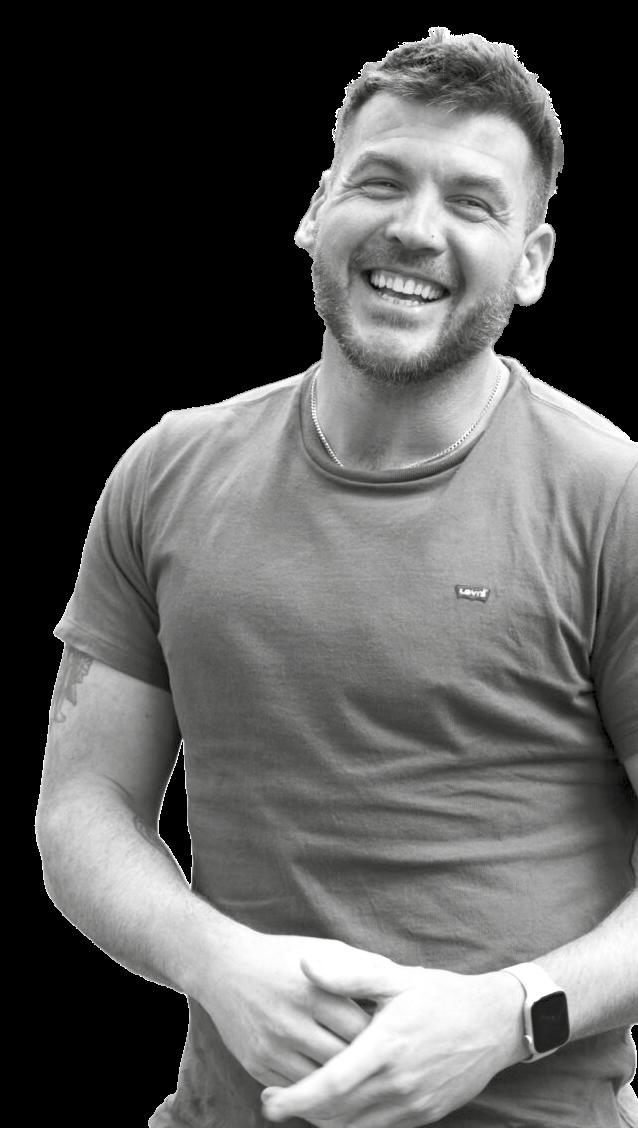
insights 37 PULSE
Retreat Yourself 2024 Transforming Spirit


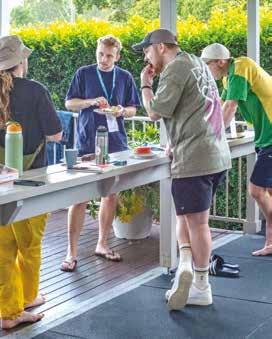


Retreat Yourself is a time for Young adults in our church to gather and share stories, to retreat and enjoy a weekend in Gerringong. It starts with a day of story telling, resourcing, and sharing from leaders and educators from Uniting Church contexts.
Every year the Moderator of NSW and ACT sponsors this leadership and learning day. It was a privilege to have the Moderator share her story of transformation in leadership and the unlikely call on her life of a God who calls a Church to look out, to hear and see the margins and the voices of those unlikely to reveal Gods Spirit to us, and for our Church’s transformation. Her story of hope kicked of what was a day of sharing from the Rev. Sunny Chen of the Assembly Resourcing Unit, Dr Matt Anslow (Educator for Lay Ministry), and then the President Rev. Sharon Hollis. They imparted their stories, wisdom and their reflections on leadership in the Uniting Church and life.
The President then spent the weekend with the young adults
“I’m so privileged to see the Spirit at work across the Uniting Church and around the globe in people coming to faith and finding hope in Jesus Christ, communities protecting creation and working for justice,” said Rev. Hollis.
38 insights PULSE


“I long for people in the Uniting Church to transform our commitment to the covenant, guided by Spirit. I saw the Spirit at work at Retreat Yourself in young adults taking the call of Jesus seriously, engaging in scripture, learning from each other, asking questions of each other, listening deeply, praying, worshipping and creating life giving community that will nourish their faith and strengthen their leadership in the months and years ahead”.
I SAW THE SPIRIT AT WORK AT RETREAT YOURSELF IN YOUNG ADULTS TAKING THE CALL OF JESUS SERIOUSLY
More young adults arrived and moved into retreat mode that evening, opening with the reading from Isaiah 40: But those who wait on the Lord shall renew their strength; they shall mount up on wings like eagles; they shall run, and not be weary; and they shall walk, and not faint.
The gathering of 65 young adults and leaders centred themselves on the waiting on the Lord, taking a break before the busyness and competing demands of life, work, study and everything else to wait on God, and ask what, or how God might be transforming


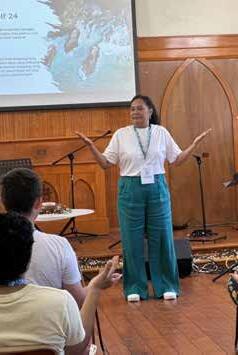

them. Which areas of life and self, church and their communities might they see God stepping in, transforming and breathing new hope.
This theme carried us through workshops, visits to the beach, stretching and walking, community time and deep conversations until the wee hours of the morning (for some).
Through song, conversation, community, and prayer, retreaters got to know each other and enjoyed being in community together.
Retreat Yourself is just the seed of what is a growing community of those who want to gather to be in community, to be upskilled in their ministries and discipleship, and with like-minded folk build on their practices of retreat and worship.
The weekend launched ‘cohorts’ with young adults across the Synod and Pulse are opening up these to anyone who works in family and children ministries, any youth or young adult leaders and of course for young people across our synod who want to join in too.
If you want to find out more about joining a cohort email: contact-pulse@nswact.uca.org.au
REV. JAMES AARON
insights 39
CREATIVE
TRANSFORMING

UNITING

SONGBOOK & LYRICS
NOW STREAMING ON SPOTIFY!


SONGS FOR CONTEMPORARY, COURAGEOUS & GROWING
CONGREGATIONS




We Still Need Jesus
WE ARE NO LONGER DEAD IN OUR TRANSGRESSIONS, BUT ALIVE IN CHRIST
By riding into Jerusalem, on an unridden donkey, Jesus is understood to be fulfilling this prophecy. He will be the Good Shepherd. This type of transition would be signalled with the new King riding the old King’s horse. An unridden donkey signals a humble ruler whose leadership is totally new and did not come from a man, but from God.
It would not be long, however, before the cries in Jerusalem would change from “Hosanna” to “Crucify him!”
31 MARCH: EASTER DAY
Mark 16:1-8, Isaiah 25:6-9
The women are scared. James’ mother Mary, Mary Magdelene, and Salome have brought spices to the tomb to anoint Jesus’ body. Their concerns about the stone blocking their way, and them not being able to fulfil their ritual duties, turn out to be unfounded. The stone has been rolled away and they can walk right in to the tomb.
But Jesus is not there.
Instead, they find a young man, dressed in white. Shockingly, he tells the three women that Jesus has risen. He is no longer dead, but will be going ahead of the disciples to Galilee.
The passage in Isaiah gives a tiny glimpse of what Jesus’ death and resurrection would mean, not just for the disciples, or Israel, but for all people, and all creation.
Mary, Mary, and Salome may not have understood what was happening. We might not have witnessed the fulfilment in its fullness yet, but in Christ’s death and resurrection, all things have been made new and we enjoy a new relationship with the loving Creator of the cosmos.
insights 41
LECTIONARY REFLECTIONS
April Producing good fruit
7 APRIL
Psalm 133, Acts 4:32-33
Psalm 133 is only three verses long. It extols the goodness of people living together in unity and harmony. It is a space of God’s blessing and prosperous life. While I have no illusions that the unity of The Walking Dead communities will last very long (this is a television show about a zombie apocalypse after all), we do read a small glimpse of it in Acts 4.
The early church, probably still understood as a sect of Judaism, are found to be sharing their goods, having things in common, ensuring that all were fed, clothed, and sheltered. No one had need.
While in our humanness, this may be very difficult to maintain, there are enough accounts of Christians living together well, and being God’s blessing to those around them, to make it a humble goal for believers.
14 APRIL
Luke 24:36b-48, Acts 3:12-19
Peter was an eyewitness to the resurrected Jesus. He was there when Mary Magdalene, Joanna, and the other women returned from the tomb and told the disciples that the tomb was empty. He heard their claims that two men had said that Jesus was alive. He was there when the two believers returned from Emmaus and shared that they had seen Jesus. He was there when Jesus appeared in the room and asked them to look at his hands and feet. He experienced Jesus opening his mind to understand Scripture.
When he spoke to the crowd outside the Temple, after he and John had healed a crippled man, Peter changed the narrative. He made it very clear that it was no power of his own that made a lame man walk. Rather, the power came from the God of the glorified Jesus. The Jesus who had been crucified by Pilate, was not dead, but alive.
Peter didn’t leave it there, however. He acknowledges that the crucifixion was
enacted out of ignorance on the part of the crowd and their leaders, who had demanded Jesus’ death. Peter then challenges the crowd to repent, to turn around, and enjoy the refreshing that comes from forgiveness and new life.
21 APRIL
Psalm 23, John 10:11-18
Psalm 23 is a Psalm of incredible confidence. The author, traditionally regarded as King David, writes that the Lord is his Shepherd, “my Shepherd”.
The Good Shepherd of this passage lays down his life for the sheep. This Good Shepherd sacrifices himself for his flock.
28 APRIL
John 15:1-8
In Isaiah 5:1-7 the prophet describes a vineyard that has been planted by God, has been carefully tended, and abundantly provided for. God expects good fruit to come from this vineyard, yet what He receives in return for all His efforts is spoiled and putrid.
Isaiah makes it very clear that the vineyard is Israel and God expects to find the nation administering justice, and displaying righteousness for all to see. Instead, the nation indulges in bloodshed, oppression, exploitation, and pride. God, therefore, has every right to perform the judgements found in Isaiah’s song.
IN THE MIDST OF INEVITABLE DARK AND TROUBLED TIMES, GOD’S PRESENCE REMAINS
It is personal and intimate, and acknowledges that in this relationship he lacks nothing.
This Psalm does not promise a perfect or problem free life. Rather, that in the midst of inevitable dark and troubled times, God’s presence remains. It provides comfort and reassurance that God will continue to provide and protect.
Jesus, when he makes the statement ‘I am the Good Shepherd’ takes on those same responsibilities. For the early Christians and for us today, rereading Psalm 23, with Jesus as Lord, He is the one who restores our souls, leads us in the paths of righteousness, accompanies us through danger, and pursues us in his gracious love all the days of our lives.
In John 15:1-17, Jesus claims to be the true vine, His Father is the gardener and His followers are the branches. As such, Jesus is the only one who can completely and perfectly fulfil God’s requirements of justice. Only He can do all that God ordains.
Just like Israel, God expects a harvest from us, His followers. We need to be fruitful. We need to produce good grapes.
If you are a Christian, the fruit you should bear is Christ Himself.
People should look at Christians and see Jesus. They should see His love, His mercy, His grace, His justice, His compassion. We should be dripping with His character, overflowing with His nature, just like a plant in full bloom.
42 insights
LECTIONARY REFLECTIONS
May: The Coming of the Spirit
5 MAY
1 John 5:1-6
One of the great places to learn about love is in music – or is it?
Love is one of the major themes of contemporary music. Yet, when you listen to the lyrics, what is described as love is often self-gratification, selfish, obsessive, stalking, objectification, and the like.
This is in stark contrast to the love that John describes Christians as having. Real love is about loving God. He comes first and foremost in the believer’s life. He is the one that holds our attention and demands our allegiance.
Love for God requires evidence and that evidence is how we love other people. There is no possibility of having a private little faith in God that says you can love God in your heart and then treat people any way you want. No, if we claim to love God then it must show in our actions, behaviour, speech, and thought.12 May, 2024: Psalm 1
My family have very fond memories of two gentlemen who epitomised the righteous described in Psalm 1.
Dr Fred Rothwell was a General Practitioner. He was known for caring deeply for his patients and including their mental and emotional health in their overall wellbeing. My mother remembers well the ways in which he walked with my brother, who endured repeated ill health. My brother would always have the last appointment of the day and Dr Fred would include prayer and Bible Study as part of the consultation.
Frank Playford was a member of the Uniting Church. He was known for his quiet, gentle faith, his seemingly endless wisdom, and his wicked sense of humour.
My mother watched them both quietly and calmly care for their sick, frail wives. Frank did so until his wife passed away, and Fred is faithfully doing this right now. Frank didn’t really want to go into care as he didn’t know what he would be able to do there. During the day, when he was in a moveable armchair, he would get the staff to wheel him over to whomever needed a listening ear or some encouragement.
These two beautiful Christian men really are examples of Psalm 1.
19 MAY
DAY OF PENTECOST
John 15:26-27; 16:4b-15, Acts 2:1-21
In the John passage, we read Jesus encouraging his disciples and reassuring them that the Counsellor was coming. It comes towards the end of a long speech given on the night of the Passover, also known as the Last Supper. Jesus has washed the disciple’s feet, exposed that there is a traitor in their midst, spoken a new commandment of loving others in the same way that he had loved the disciples, and claimed that he is the true vine.
THE SPIRIT OF GOD WAS BEING POURED OUT, IN ORDER THAT ANYONE WHO CALLS ON THE NAME OF THE LORD WOULD BE SAVED
The coming of the Spirit is understood by Jesus to be necessary and a beneficial move of God, that offers people an opportunity to find new life.
Jesus’ promise was fulfilled on the day of Pentecost, another celebration of the Jewish faith, which occurs 50 days after Passover. The disciples, the women, and some other followers were gathered together in a room in Jerusalem. In a spectacular fashion, the Holy Spirit comes upon and fills them all.
Peter, newly filled with courage, speaks to the crowd assuring them that this is the fulfilment, not only of Jesus’ words, but of the prophecy of Joel 2:28-32. The Spirit of God was being poured out, in order that anyone who calls on the name of the Lord would be saved.
26 MAY
TRINITY SUNDAY
Psalm 29
Psalm 29 is a majestic song of praise to the Creator of the natural world.
The Psalm describes the powerful act of a thunderstorm. Water is whipped up and pours down. Thunder rumbles so loud it shakes the earth. Lightning hits
with such power and force that fire can start. Wind moves so fiercely it can strip trees of leaves and branches.
God is not the storm. God is not the rain, or the thunder, or the lightning or the wind. God is the Creator of all of these.
As such, God deserves to be worshipped and glorified. This is in stark contrast to other religions of the time which worshipped natural phenomena and objects. Being the Creator of all things, God is far more powerful than anything nature can display.
The only response that the heavenly beings can make, and by extension, humans, is to cry “Glory”.
God remains Lord over the flood, over the storm, over the sun and the moon, and all creation. As the forever King he is worthy of worship and praise.
David, the Psalmist, requests two things of this powerful creator God. That God might give strength to God’s people and bless them with peace. "
DR KATHERINE GROCOTT
insights 43
BELIEF MATTERS

FIVE DECADES ON
THE CRUCIFIED GOD’S IMPACT
Ahead of Easter, and with its 50th anniversary taking place next year, Insights spoke to two of the Uniting Church’s theologians about the impact the book had in its context, on them, and what it might have to say to the church today.
Rev. Dr Clive Pearson is a former Principal of United Theological College. He told Insights the book was a 20th century classic.
“It is in the nature of a classic to address times and contexts beyond which it was itself written,” he said.
“Moltmann’s theology would in due course engage with feminism and gender, spirituality and other religions, the secular society, the Christian voice in the public domain, the care of creation, the economically vulnerable etc. The Crucified God was one of several foundational texts upon which he constructed the theology that engaged with these themes / issues.”
“Moltmann reminds us that the church’s identity (and the relevance of the gospel it proclaims) is inescapably woven into the cross of Christ. In and through the
cross God is the subject as well as the object. God addresses us through the cross of Christ. The cross of Christ represents not only Jesus’s suffering and death but also God’s identification with the suffering of the world.”
Rev. Dr Ockert Meyer lectures in Theology and Preaching at United Theological College. He described Moltmann’s impact on systematic theology as “huge.”
ONE CANNOT TALK ABOUT GOD, APART FROM WHAT WE LEARN OF GOD FROM GOLGOTHA
“Rather than simply trying to defend orthodoxy, his aim was to try and imagine new ways of thinking about God, theology and the world,”
“The Crucified God was Moltmann’s way of insisting that one cannot talk about God, apart from what we learn of God from Golgotha: from the cross and the dying Jesus’ perspective,” Rev. Dr Meyer said
Released in 1975, Jürgen Moltmann’s book The Crucified God explores the implications of Christ’s crucifixion for a theology of God.
Nearly five decades after its release, the text is regarded as a classic text in considering the Cross. Jürgen Moltmann, now in his 90s, is a German theologian who was held as a prisoner of war after World War Two. Moltmann later recalled being shaped by that experience as well as learning about the holocaust.
According to Rev. Dr Meyer, the book’s main contribution lied in the way it challenged the concept of God’s impassibility: the idea that He does not suffer or change as the result of the actions of others.
“This (the classic doctrine of impassibility) does not mean that God is apathetic or indifferent but merely that God’s nature is not determined by others,” Rev. Dr Meyer said.
“God’s impassibility is intrinsic to God’s being. It means that God is not susceptible to emotional fluctuations in the ways that we are. If anything, it means that God’s love is not changed by the way that people respond to God.”
“Moltmann’s ideas were deeply influenced and shaped by his own personal experiences – both as a prisoner of war in World War Two and witnessing the suffering of millions of Jews during the holocaust.”
“What Moltmann is saying is that suffering is an unavoidable element of love and therefore, that God’s love is not diminished by suffering, if anything, it is deepened by it. In other words, if people asked, as Elie Wiesel did, pointing to
44 insights
Illustration: Evan Rosa (faith.yale.edu)
the dying children on the gallows in Auschwitz: where is God? Then the answer is that God is there, hanging on the gallows.”
“It is hard to quantify the book’s direct impact because there were so many other similar movements in theology at the time,” Rev. Dr Meyer said.
“Its enduring influence lies also in the way that it dovetails with liberation theology and to a certain extent some sentiments of post-colonial theology (especially the view from below and that God is to be found in places of desolation, despair and even radical absence – what the cross has become symbolic and almost paradigmatic for.)”
HOW THE BOOK SHAPED MINISTRIES
“Both Rev. Dr Pearson and Rev. Dr Meyer told Insights that reading The Crucified God impacted on their own theologies. While he was not aware of the book during his theological studies, Rev. Dr Clive Pearson said he later came to learn about it during a lecture from Moltmann himself in the early 1990s in Dunedin, Aotearoa New Zealand.
“One of Moltmann’s asides (which he gave to Volf, his own former student) was that one must live theologically. In other words, it is not enough simply to produce the theological thoughts of others or interpret the way the world is through the lens of another,” he said.
Our theologies should arise out of our own lived experience / theology - to which I would add, knowing what the shape of a Christian theology should assist in that task.”
“In the course of this lecture Moltmann left us spellbound. He spoke of how he had grown up in a secular fashion with the rise of Nazism; he was conscripted while only 16. His home town was Hamburg and he was present when it was firebombed by the Allies. There was much loss of life – including one of his friends. Moltmann was left wondering why had he survived. Why had he not died? This experience would become a part of what he would the experience of finitude. WE come to terms with our limits, our finiteness, our prospective endings.”
“That experience of finitude sits alongside a further dimension of a theology informed by life. The Hamburg experience would become a ‘companion experience’. We all have these experiences. They are formative experiences that have happened in
the past but their power is enduring. Sometimes they come back to the fore; sometimes they remain submerged, shaping us nevertheless.”
“The firebombing of Hamburg was one of Moltmann’s companion experiences. It should be seen alongside his becoming a prisoner of war. Those in the camp were exposed to photographs of the concentration camps. Some took their own lives; Moltmann was himself suicidal but was ‘befriended’ by Christians while he was in the camp. He received his first New Testament and was struck by the cry of Jesus on the cross at Mark 15:34: “my God, my God why have you forsaken me”. Moltmann was left feeling that here was ‘someone’ who could understand his desolation and abandonment.”
SUFFERING IS AN UNAVOIDABLE ELEMENT OF LOVE AND THEREFORE, GOD’S LOVE IS NOT DIMINISHED BY SUFFERING
“My understanding of Moltmann’s Crucified God cannot be separated from hearing him speak in person at this conference.”
“Perhaps one of the most important considerations in my own decision to study theology, was the theodicy,” Rev. Dr Meyer said.
“The question about human suffering, Christ’s suffering, the suffering that is almost genetically imposed upon creation, has always haunted me. Given this, it is almost impossible not to take note of Moltmann; especially his Crucified God and Theology of Hope (these two should always be read side by side). When I first came across The Crucified God, the idea of God’s solidarity with us in our suffering was hugely attractive and compelling.”
CRITIQUING THE CRUCIFIED GOD
As with any theological text, there is a critique to be made of The Crucified God. Rev. Dr Meyer said the text was best read within its historical context, and that there were elements that could have been further explored.
“I think it is important to read the book within its historical context (as postAuschwitz theology) and as an attempt to highlight God’s pathos (following
Heschel), countering the theist idea of God as an indifferent first mover or clockmaker,” he said.
“The question, however, is if Moltmann did not perhaps go too far in this, first in whether he still honours God’s transcendence in the ways that both Rosenzweig and Heschel would. Closely related to this is whether Moltmann sufficiently makes a distinction between divine suffering and human suffering.”
“For progressive Christians in wealthy countries Moltmann’s ideas are attractive" Rev. Dr Meyer said "because it makes God appear so human.
“However, if you speak to Christians in poor countries, their expectation of God is much more than merely divine gestures of compassion: they expect God to do something about their suffering." he said. "For them it is not enough to say that God is with you, but ultimately equally powerless to do anything about it. God’s pathos for them, means more than God’s ability to share our suffering; it must include God’s ability to change our suffering.”
“In other words, my fear is that our ideas (in the UCA) about God’s pathos and compassion can easily become another kind of theodicy, very much like Job’s friends.”
JONATHAN FOYE
This piece has been edited for length. To read the full text, visit: tinyurl.com/yc234aba
The Crucified God is available to borrow from Camden Theological Library, or to purchase from Amazon.
insights 45
The Boys in the Boat
REMINDS US OF THE POWER OF THE UNDERDOG
When you think about great sports movies, from A League of Their Own to Cool Runnings and even the recent Next Goal Wins, there’s one common narrative that connects each one: an underdog. Someone who, despite all odds, you can’t help but root for. Through their trials, their shortcomings and their flaws, there’s something about their spirit that keeps you hopeful.

And the only thing better about one underdog, is a team of underdogs.
That’s what we find in The Boys in the Boat. A group of young, working-class men from the University of Washington come together to work hard — physically, emotionally, financially — and defy everyone’s expectations by becoming the best rowing team of 1936.
“I like stories of people pulling themselves up by their bootstraps,” director George Clooney told the Relevant podcast recently. The acclaimed actor and filmmaker first fell in love with the inspirational story when he read the 2013 book of the same name.
not. Joel Edgerton, who plays Coach Al Ulbrickson, knows that now, more than ever, our culture needs to be reminded of the human strength that’s inside all of us.
“Coming out of COVID lockdown, I was craving to watch a movie like this,” Edgerton said. “There’s something about that period that reminded me, when things get bad and adversity hits, people become the most helpful to each other. And I think one of our core values as human beings is that we want to be together. We want to cooperate and help each other.
OUR CULTURE NEEDS TO BE REMINDED OF THE HUMAN STRENGTH THAT’S INSIDE ALL OF US
“I like sports movies, in general,” he shared, “but I liked that this was a true story. The romance, the unbelievable things that went wrong for them. And while these people weren’t supernatural heroes; they’re just people with great drives. It’s like a good, old-fashioned movie.”
While the story itself may feel “oldfashioned,” the message behind it is
“Sport is one of those things that stands above politics and all the things that divide us,” he continued. “Sports movies make us feel good. It’s important every now and then to be reminded that human beings are at their core really decent animals.”
Edgerton’s words rang true for the young actors who took on both the emotional and physical toll of playing hard-working rowers. Callum Turner, who plays Joe Rantz, shared that the cast trained for five months, rowing four hours daily.
“The way that we got to do it was nothing short of remarkable,” he shared. “They
set us up as basically a professional sports outfit.”
But while the physicality of a sports film draws viewers in, it’s the tug at the heartstrings that stick with us long after the credits roll. Take Hadley Robinson’s character Joy, for instance. As Joe’s love interest, Robinson’s role allows audiences to see themselves in the greater narrative — a person who is on the edge of her seat wishing, hoping, wanting the team to pull it off.

“I LIKE STORIES OF PEOPLE PULLING THEMSELVES UP BY THEIR BOOTSTRAPS” DIRECTOR GEORGE CLOONEY
“Joyce offers up a sort of positive light,” Robinson said. “A juxtaposition to that energy of survival. She’s in a similar position, but approaching it from a different perspective.”
It’s that positivity that rings throughout the whole film. Despite the setbacks and naysayers, the team fights for the light and clings to the hope of a brighter future. And as a new year begins, it’s a gentle reminder that no matter what you might be facing as an underdog, there’s plenty of hope for your own future.
ADRIAN DRAYTON
The Boys in the Boat is available to rent on iTunes and Google Play.
To hear more of the conversation with the cast of The Boys in the Boat, find The Relevant Podcast wherever you listen to podcasts.
46 insights
ENTERTAIN ME

UNDERGRADUATE CERTIFICATE
utc.edu.au/courses/undergraduate-certificate-in-theology
SCAN
GRADUATE

SCAN

UNDERGRADUATE AND GRADUATE CERTIFICATES IN THEOLOGY Study Certificates build credit for Diplomas & Degrees Duration 1 Year Part Time Full subject lists are available on the website: Need additional information? Speak to us today! (02) 8838 8900 studenta@nswact.uca.org.au 16 Masons Drive North Parramatta www.utc.edu.au Charles Sturt University is an Australian University, TEQSA Provider Identification: PRV12018. Charles Sturt University CRICOS Provider 00005F STEP INTO UNI STUDY ONLINE OR ON CAMPUS FEE SUPPORT FOR ALL UCA STUDENTS Deepen your faith and discipleship, and explore a future in ministry and leadership UNITED THEOLOGICAL COLLEGE & CHARLES STURT UNIVERSITY
IN THEOLOGY
QR CODE FOR FULL SUBJECT LIST →
CERTIFICATE IN THEOLOGY
utc.edu.au/courses/graduate-certificate-in-theological-studies
QR CODE FOR FULL SUBJECT LIST →
Share
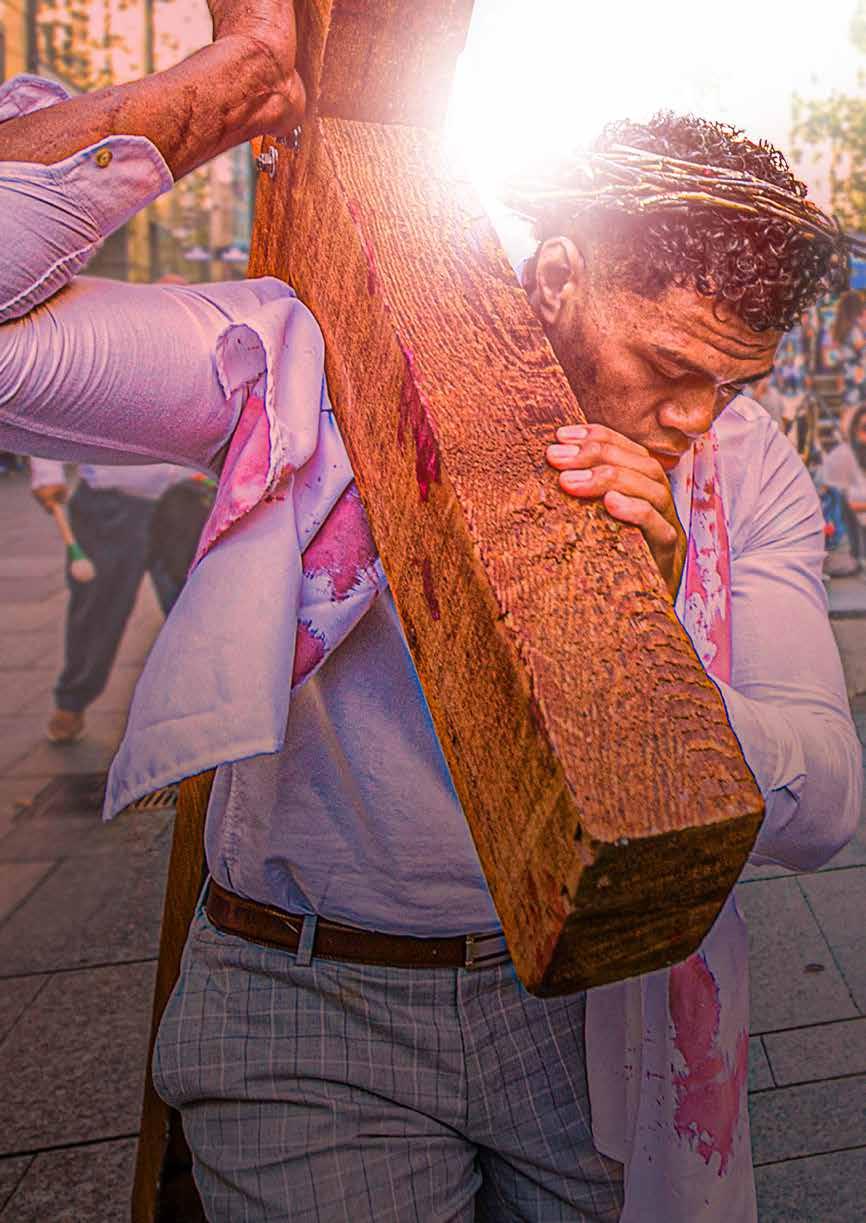

hope Join us as we partner with the wider church of Sydney and share the hope of Easter with our city. GOOD FRIDAY Street performance
March | 1pm Martin Place Amphitheatre, Sydney Free to attend or stream online Scan for details
29







 REV. JANE FRY GENERAL SECRETARY
REV. JANE FRY GENERAL SECRETARY















































































